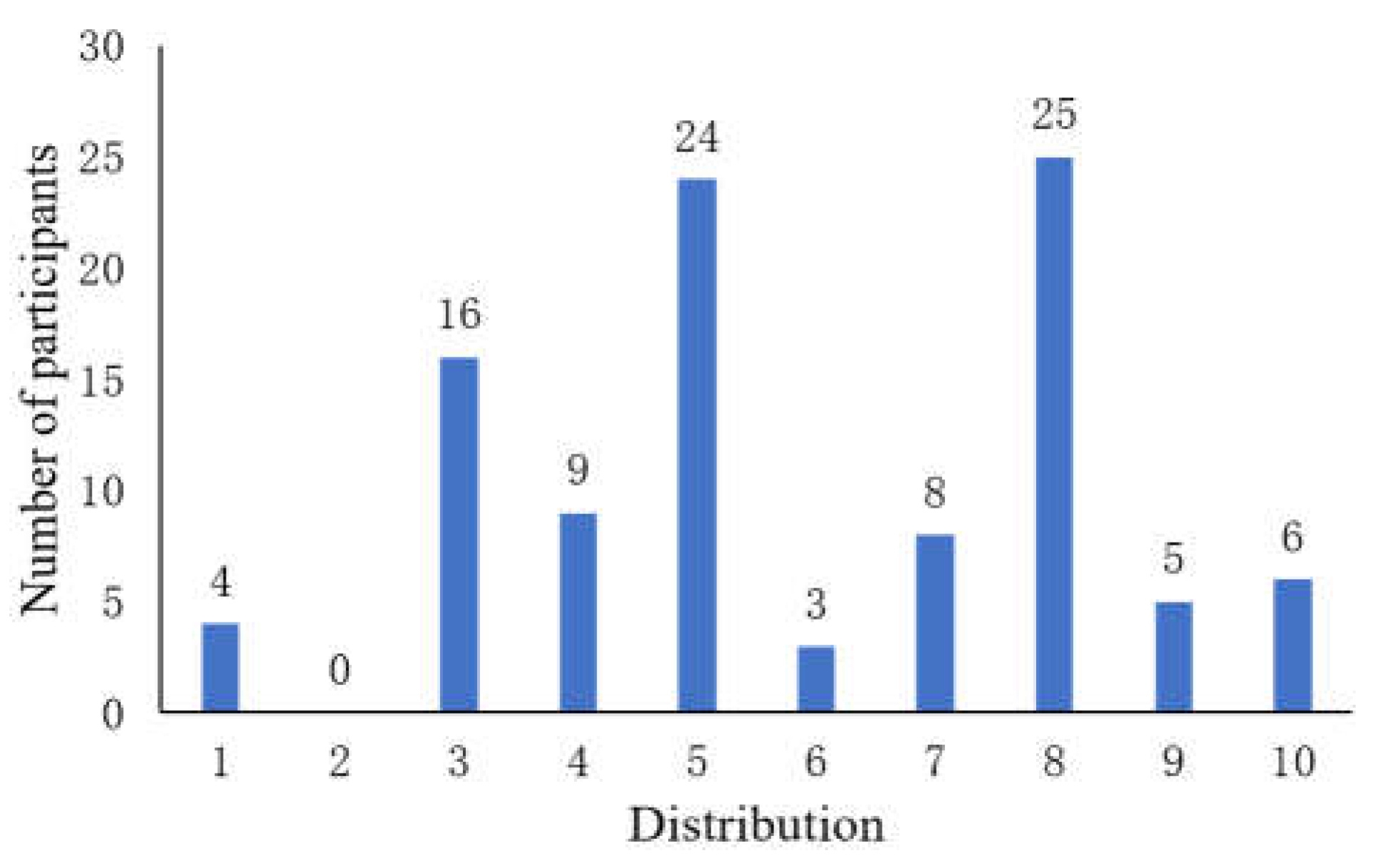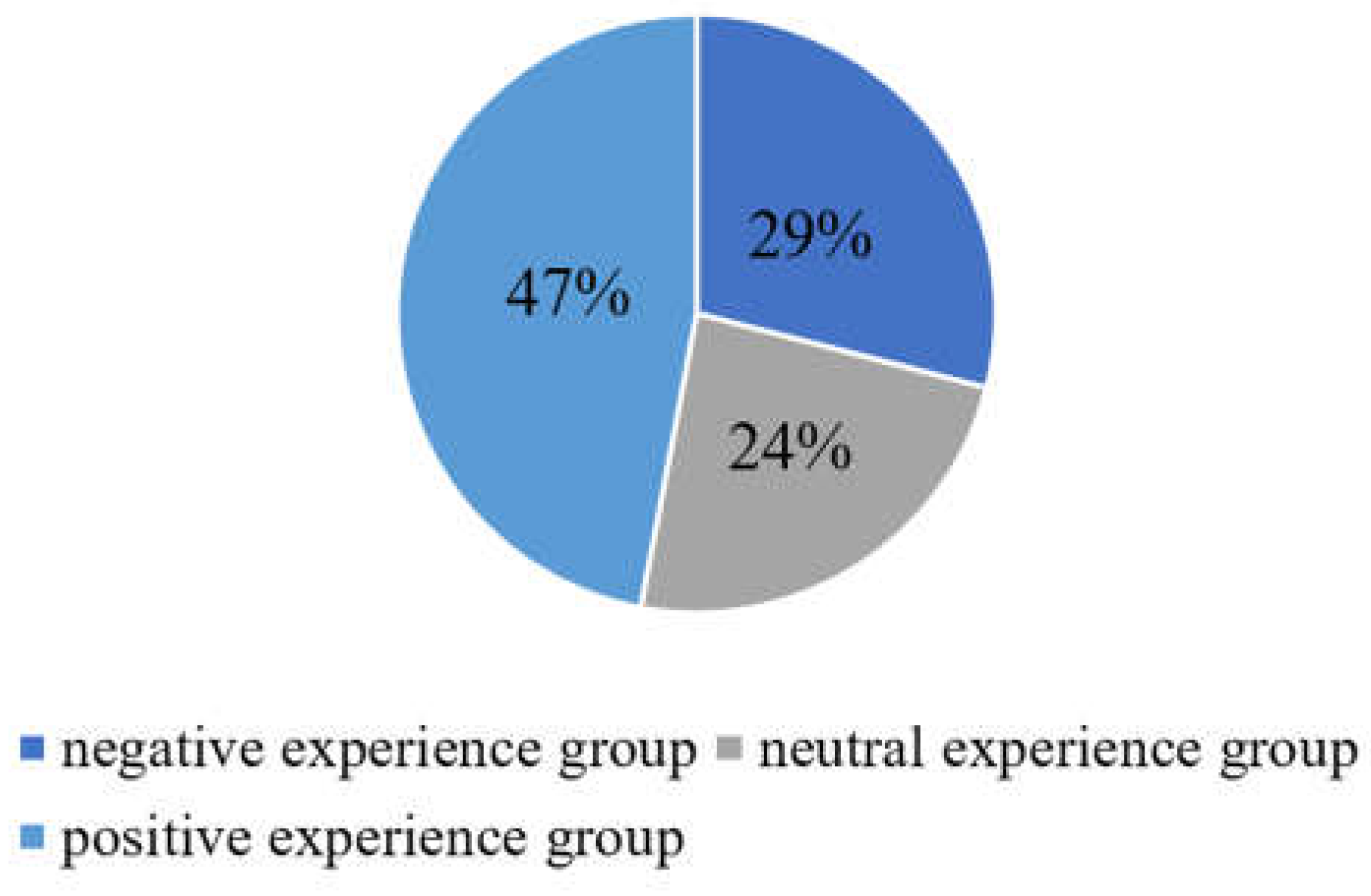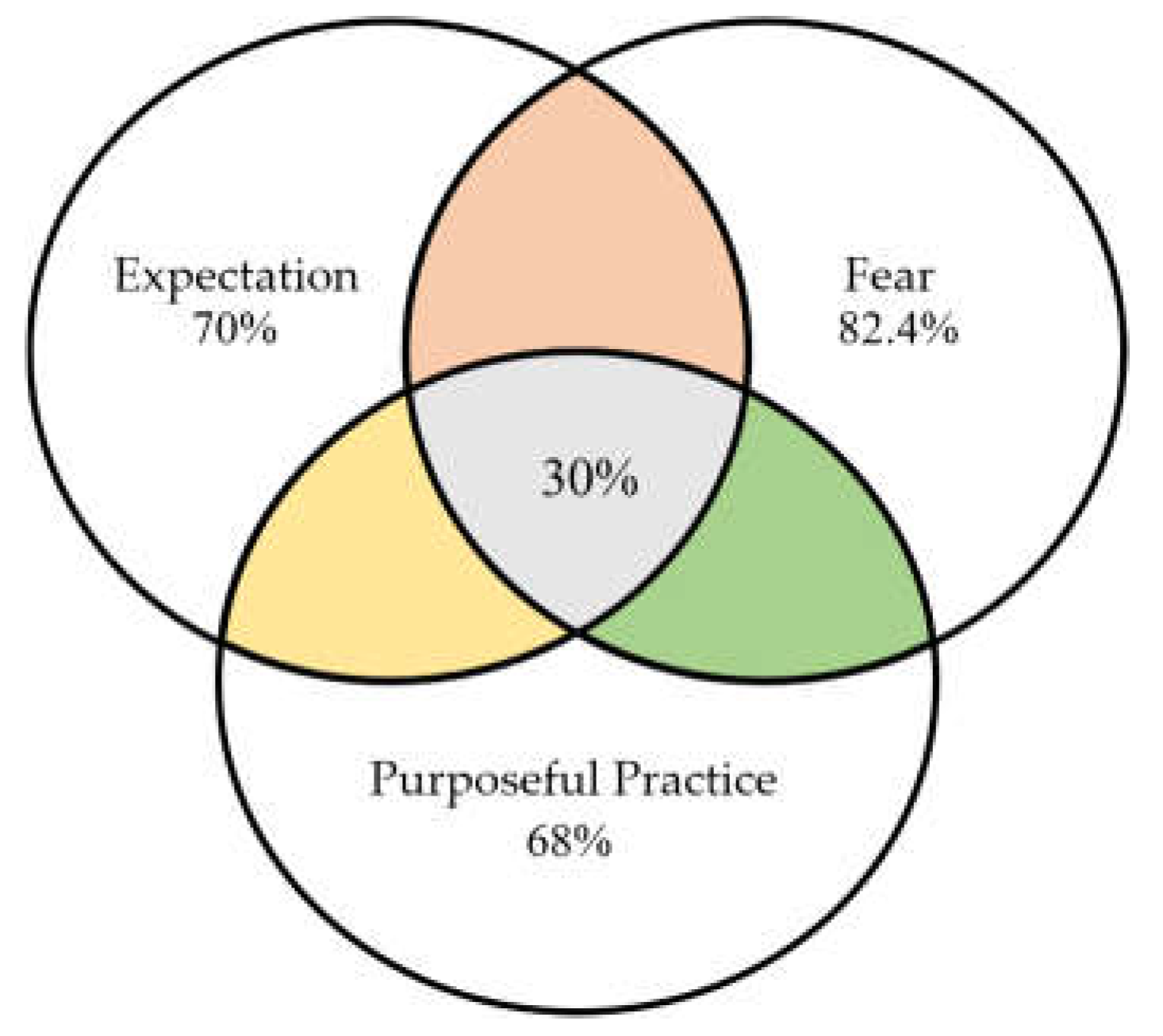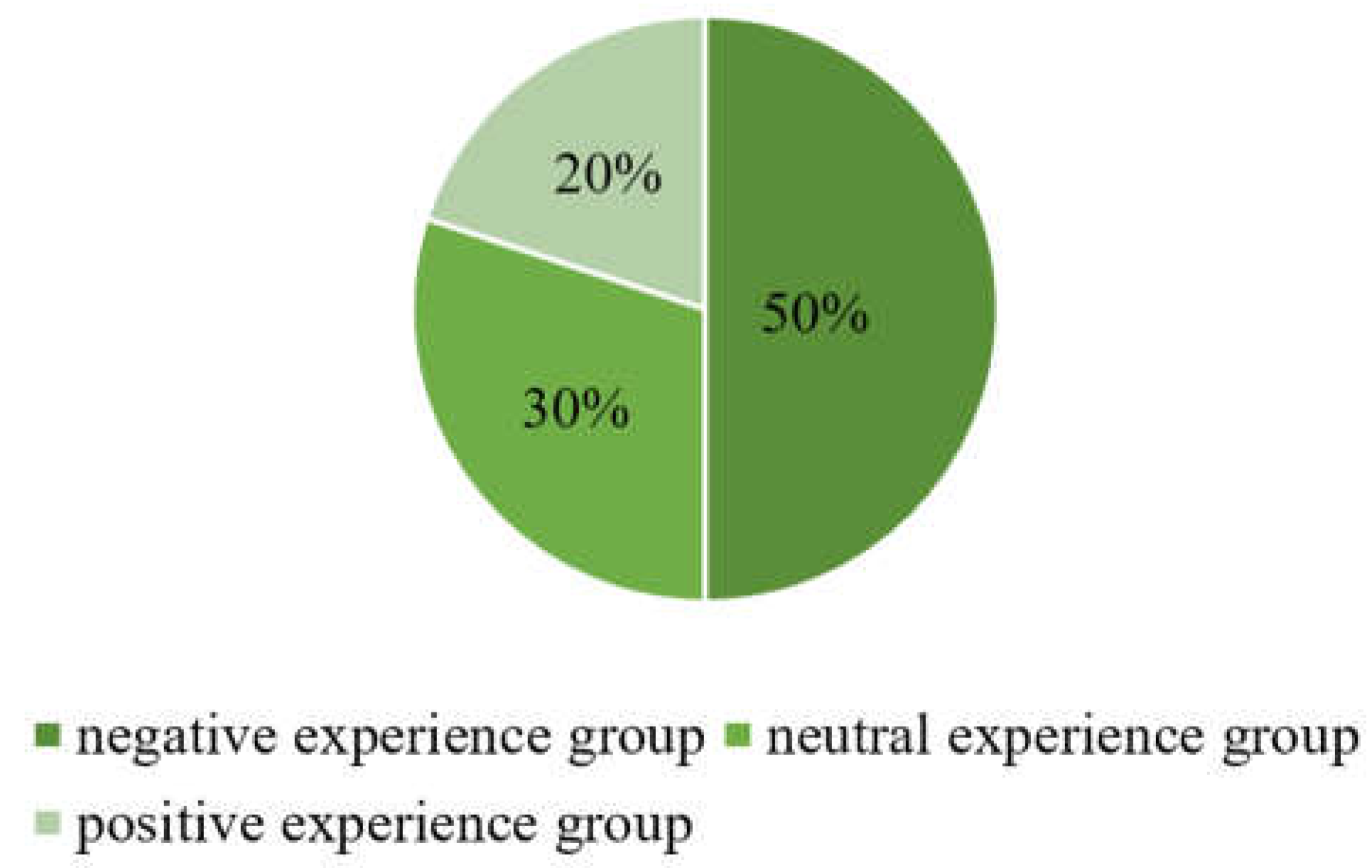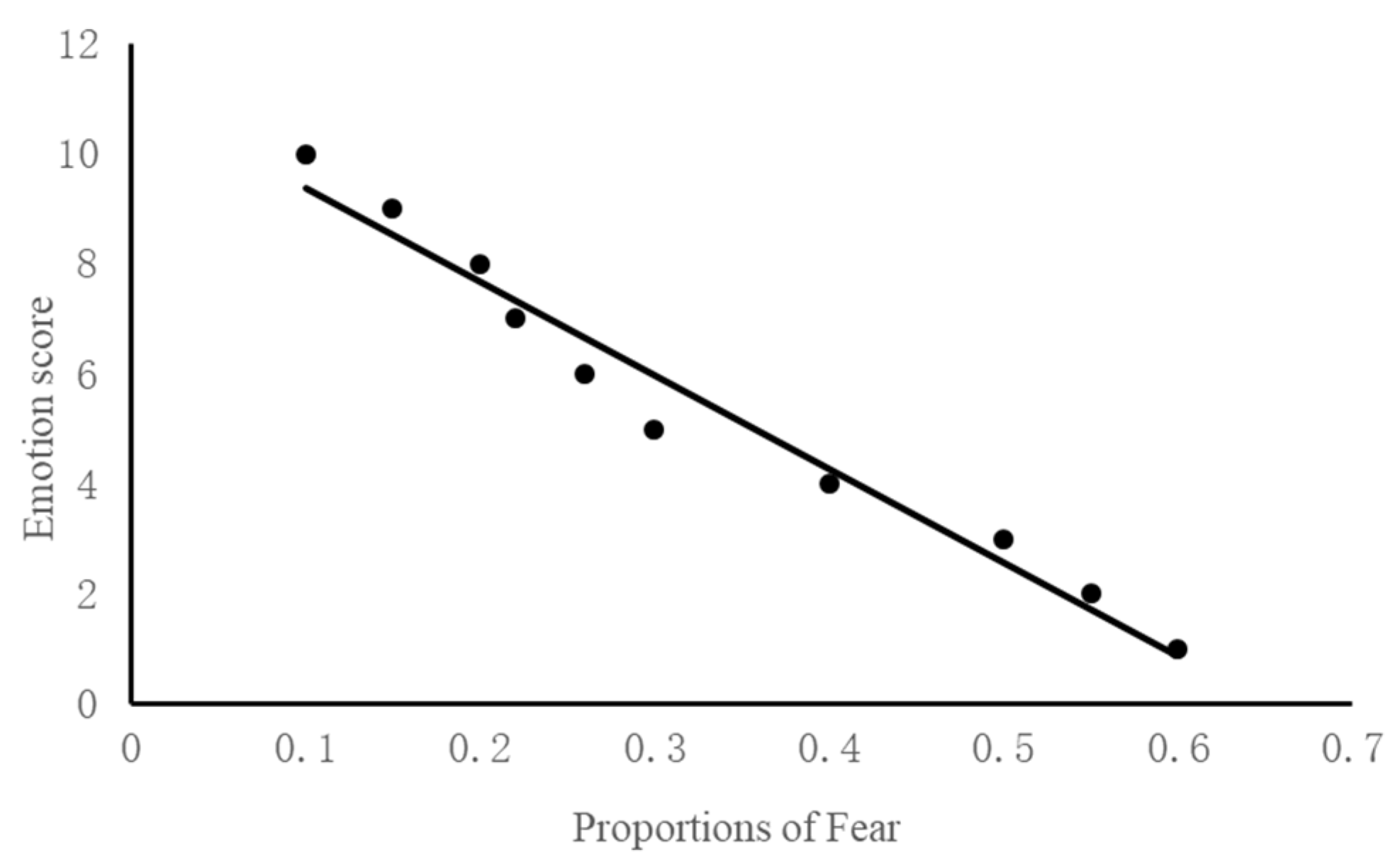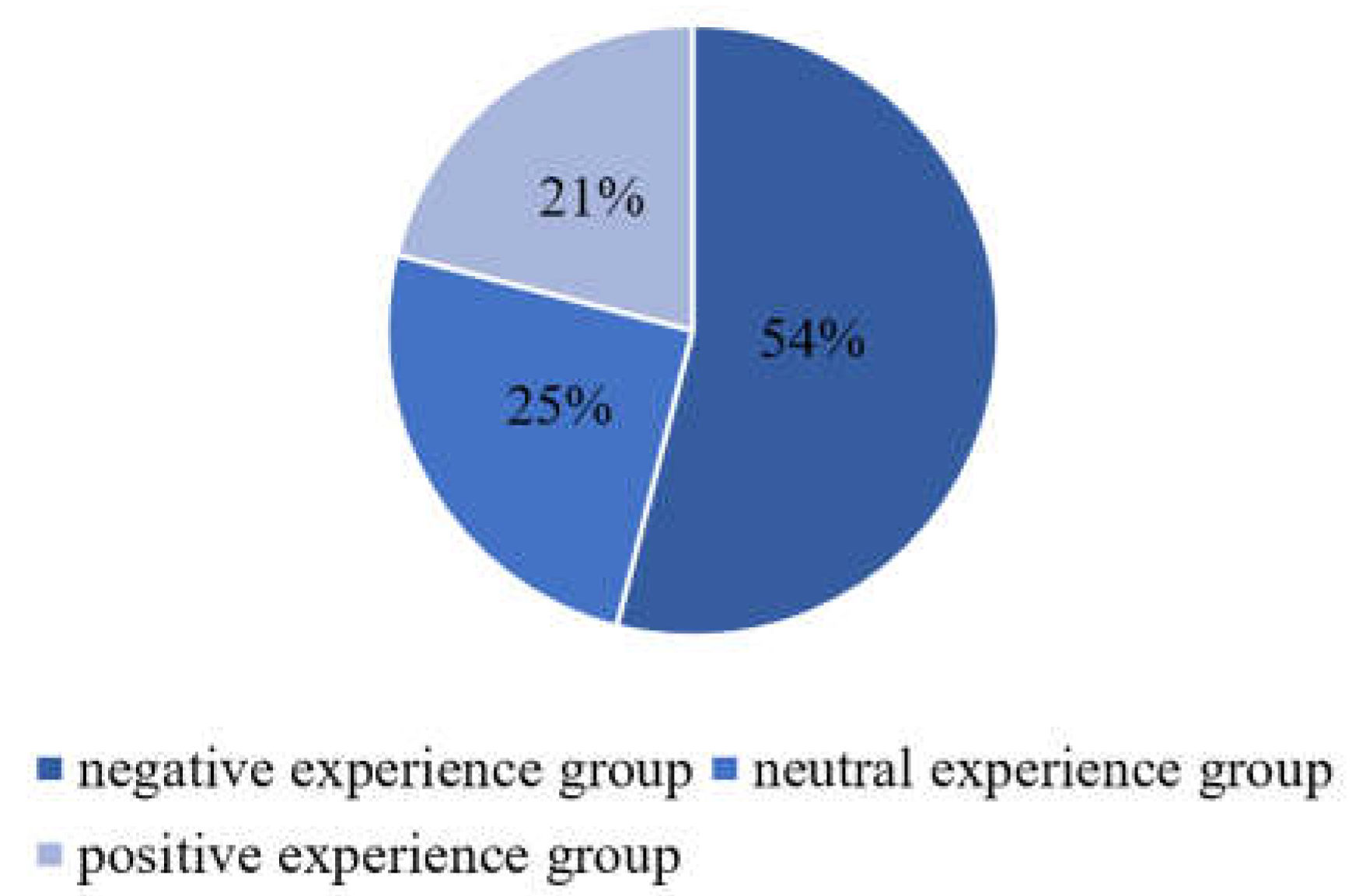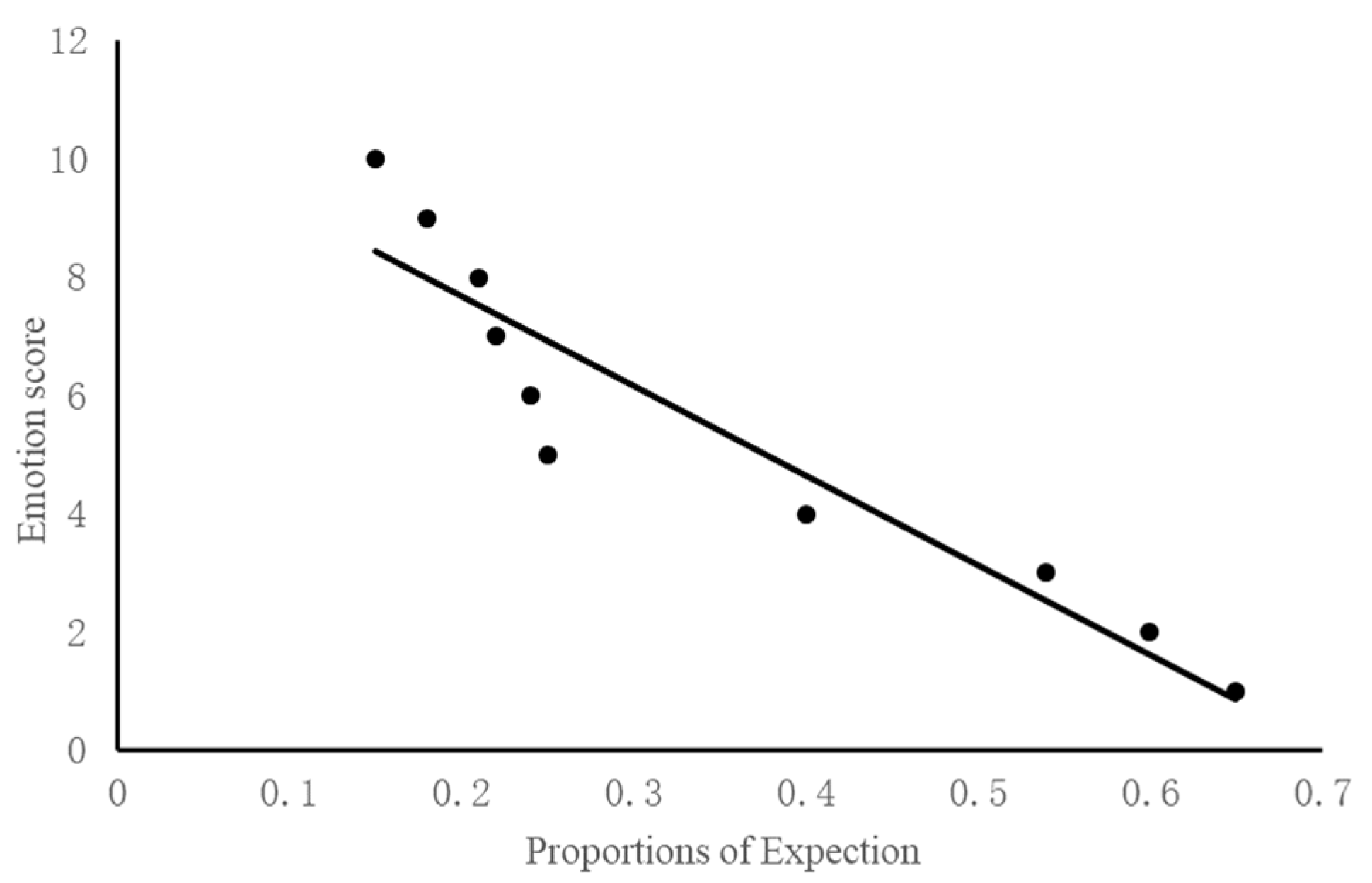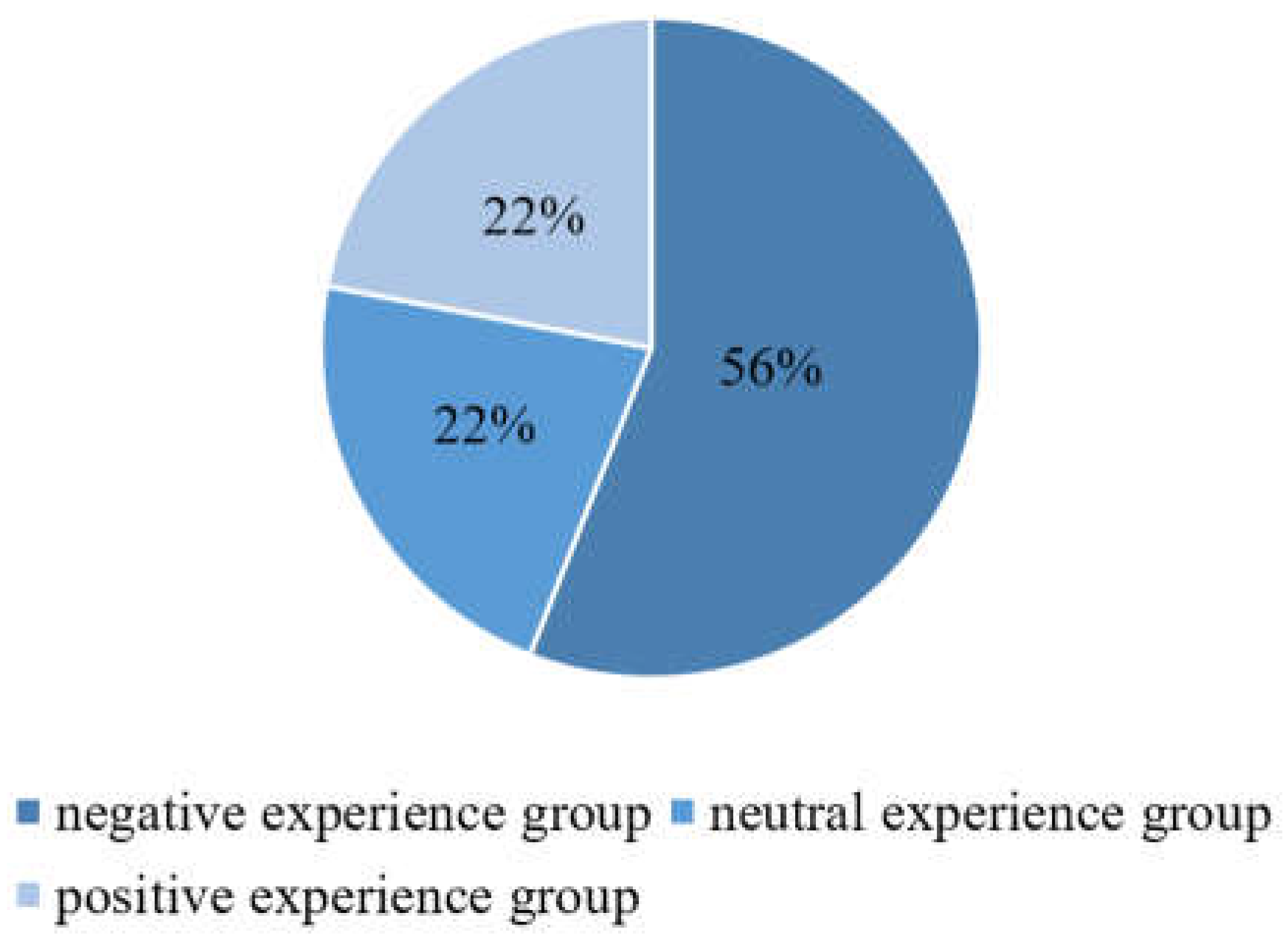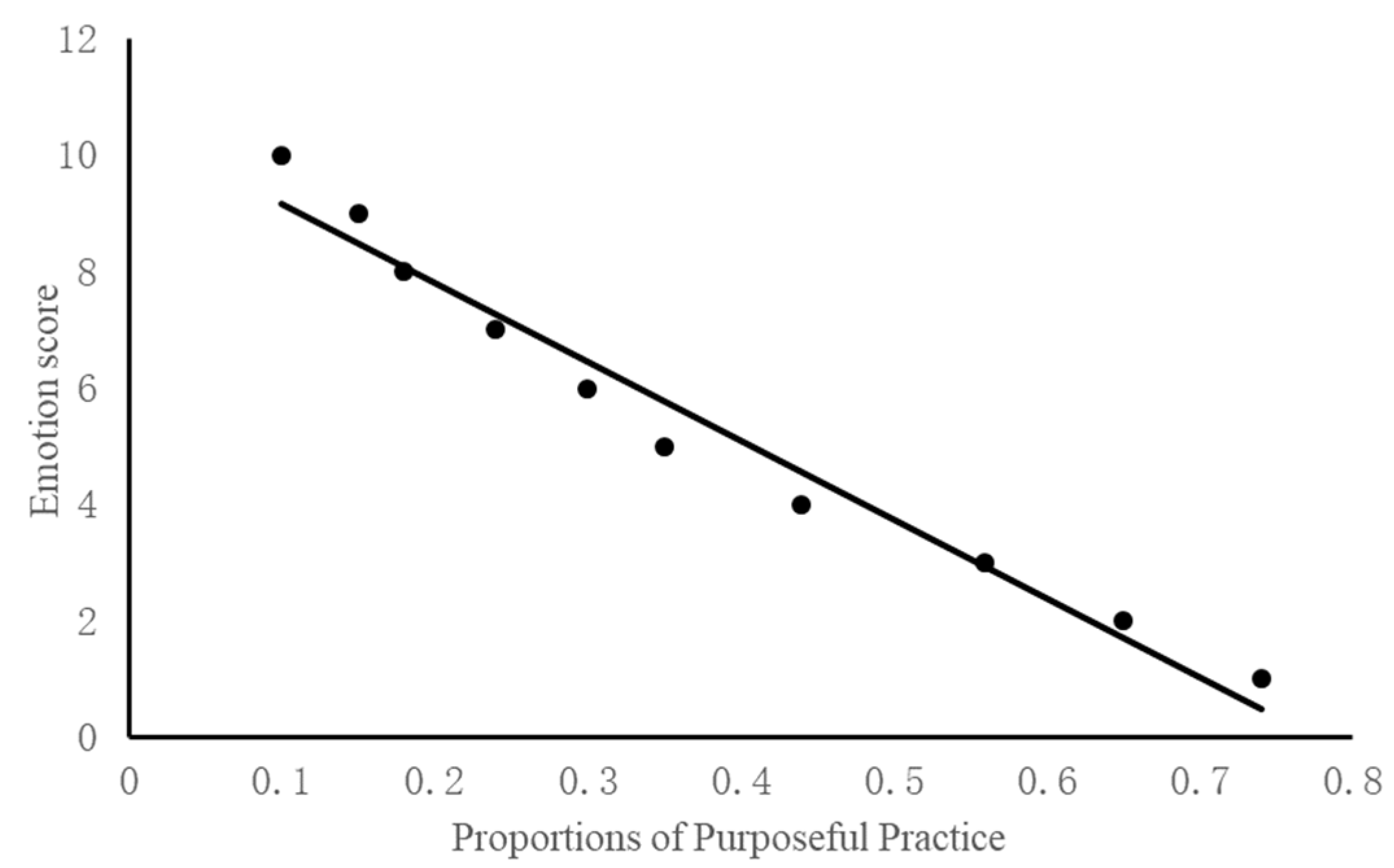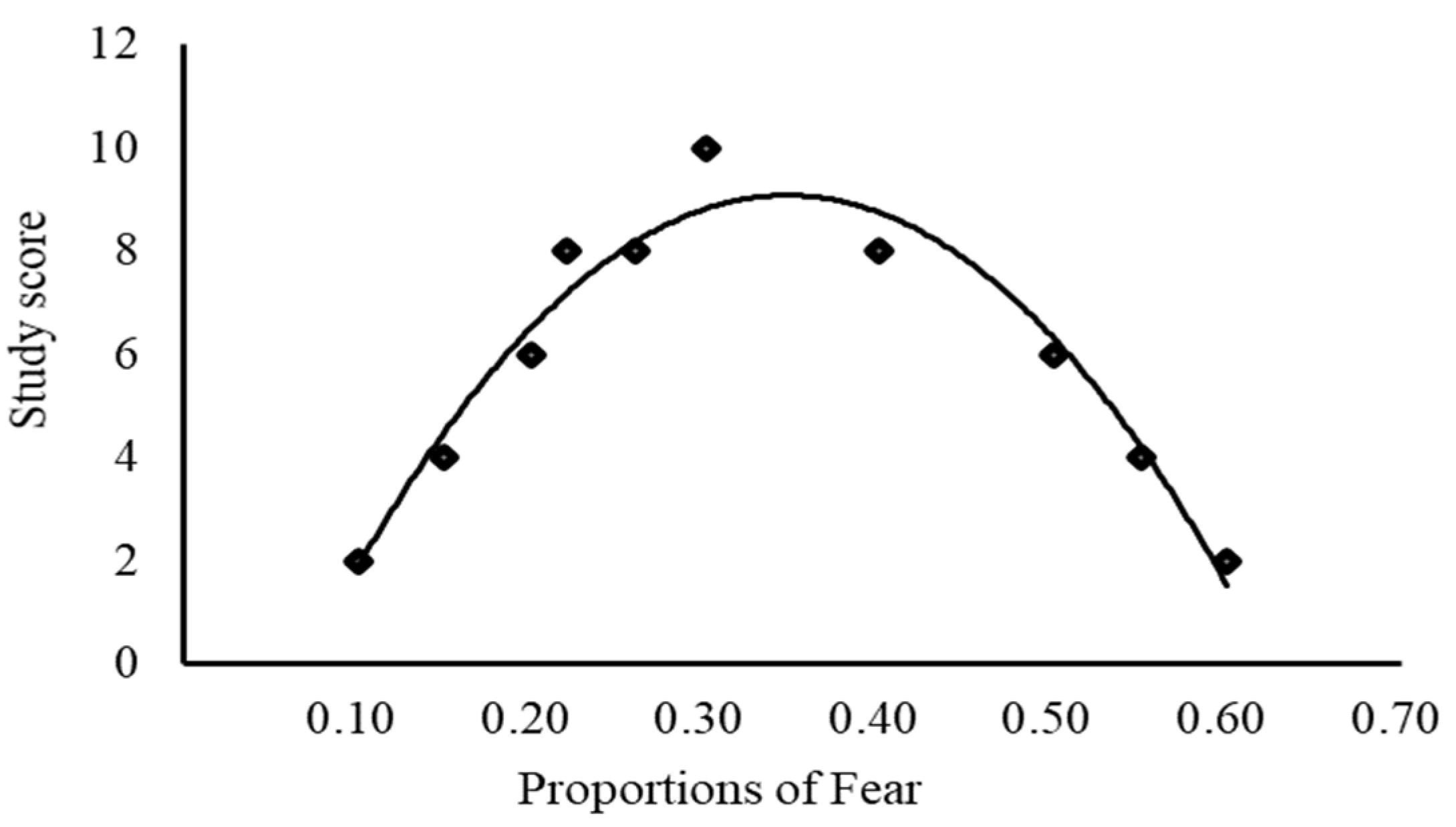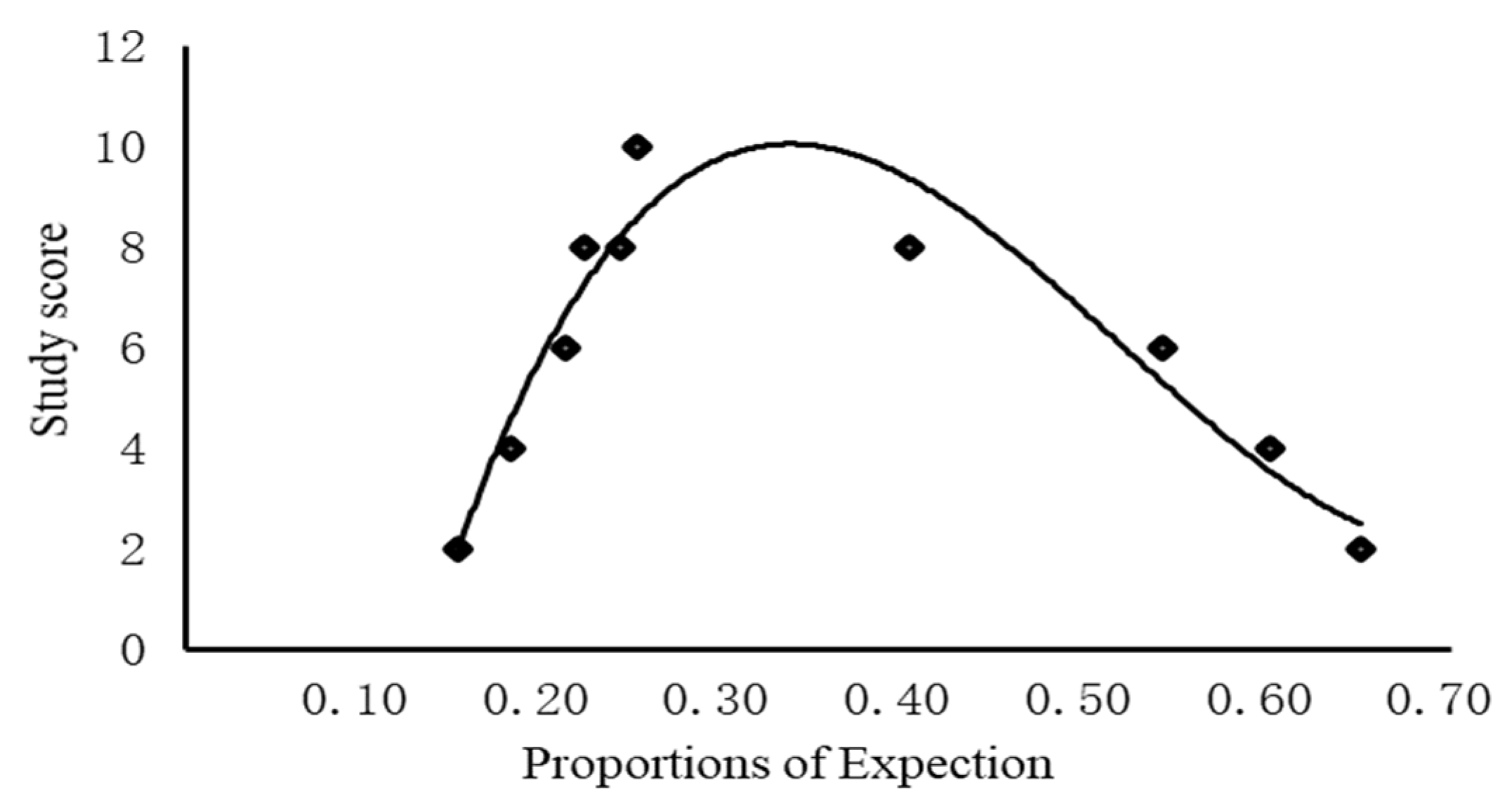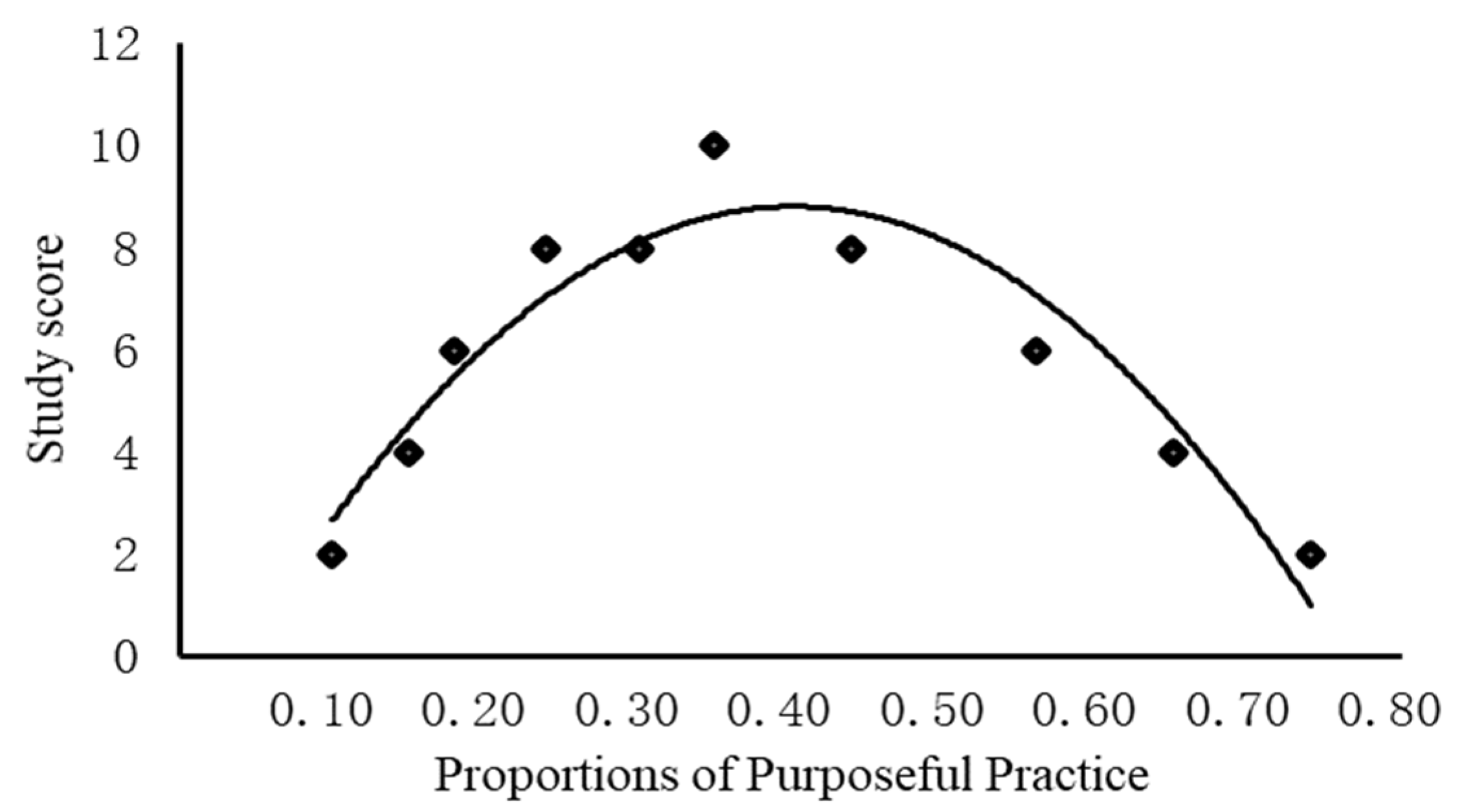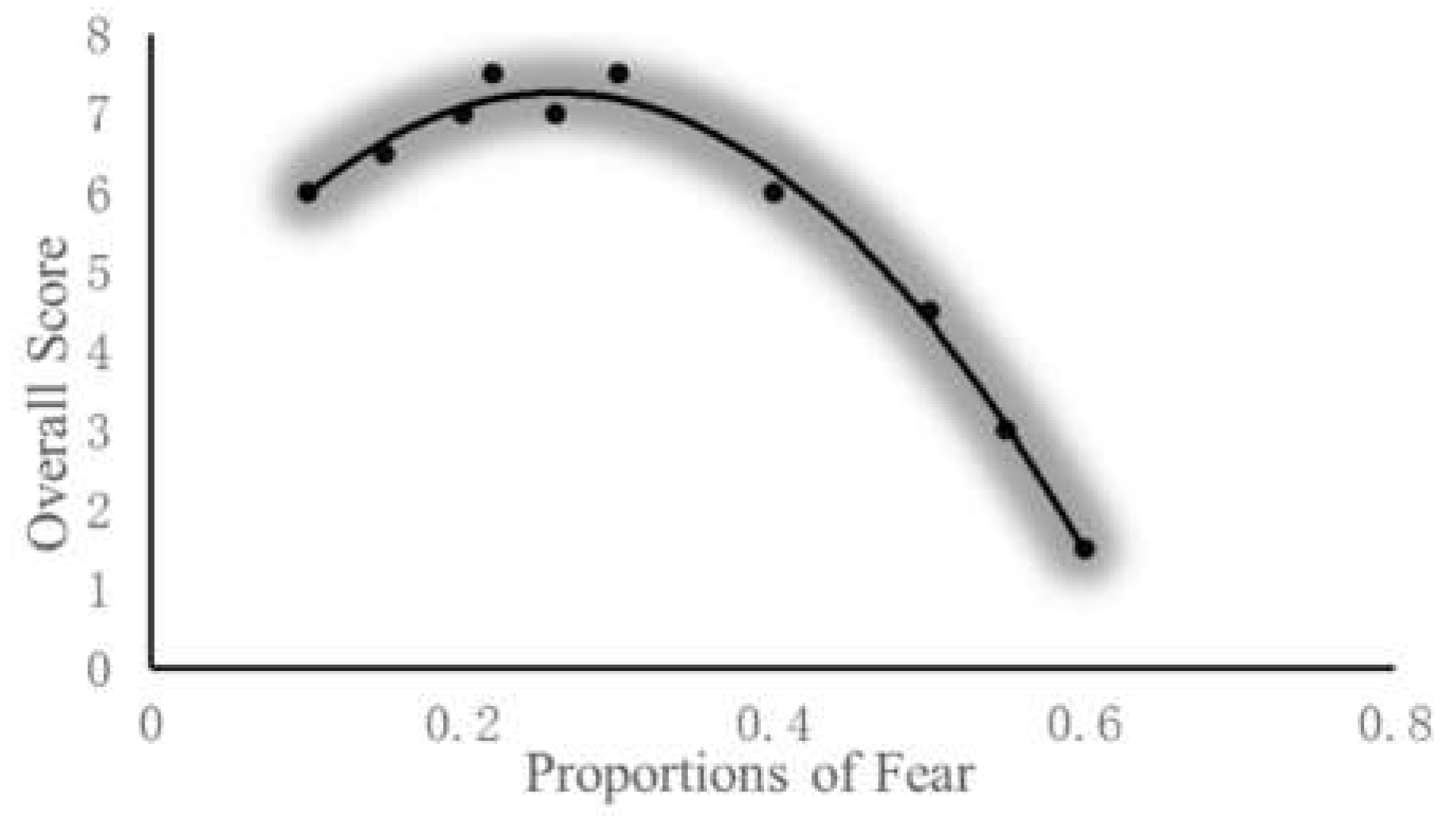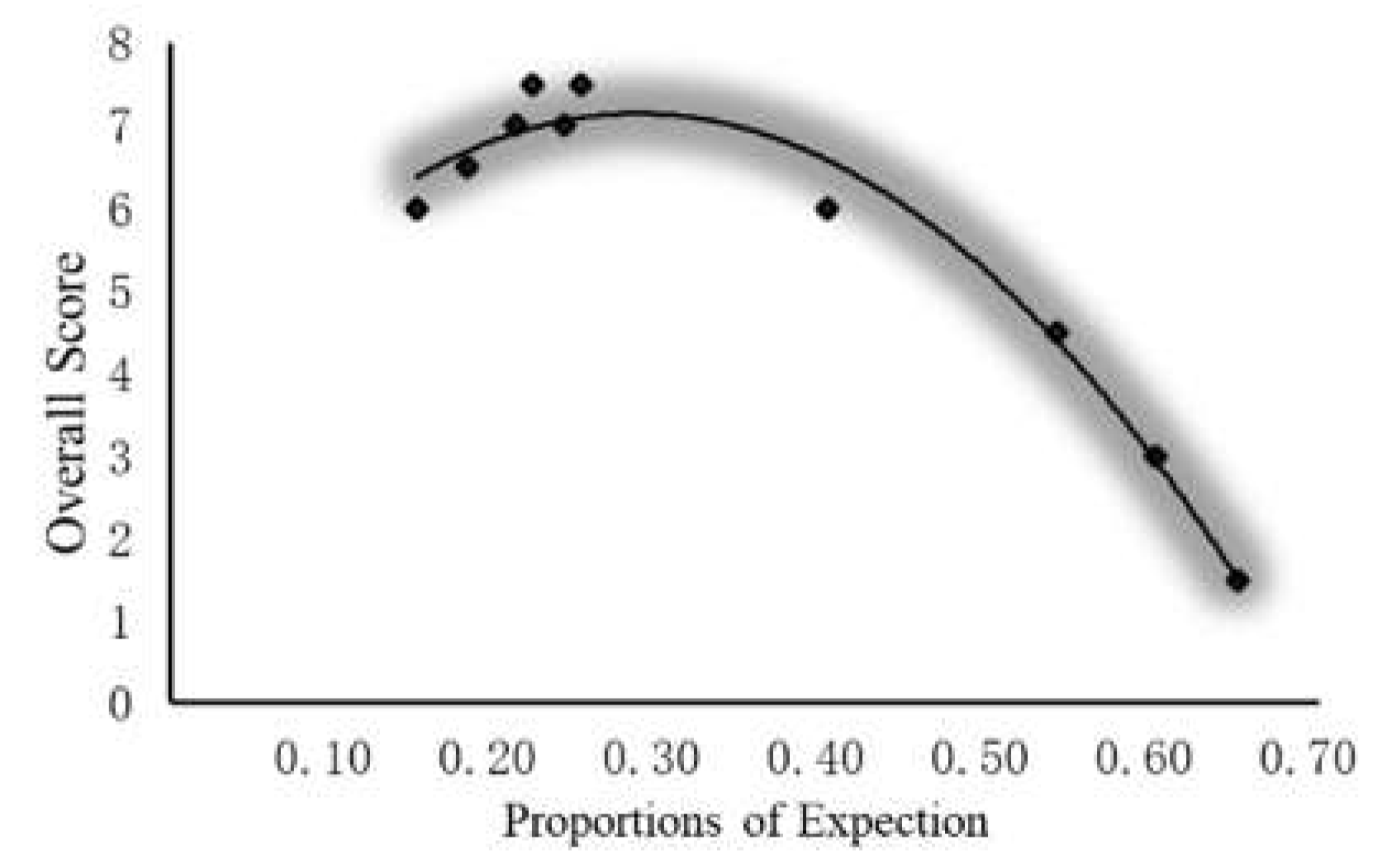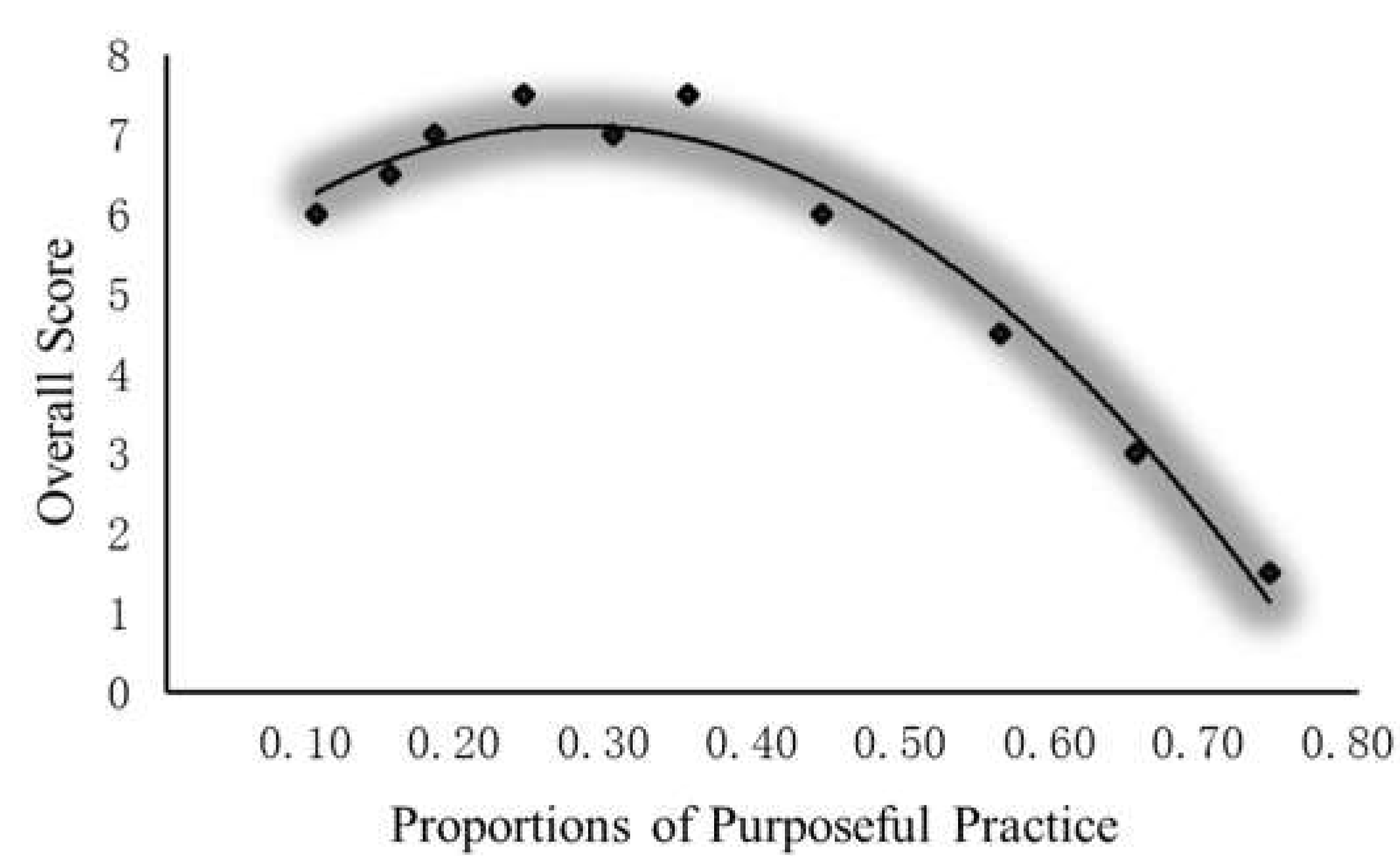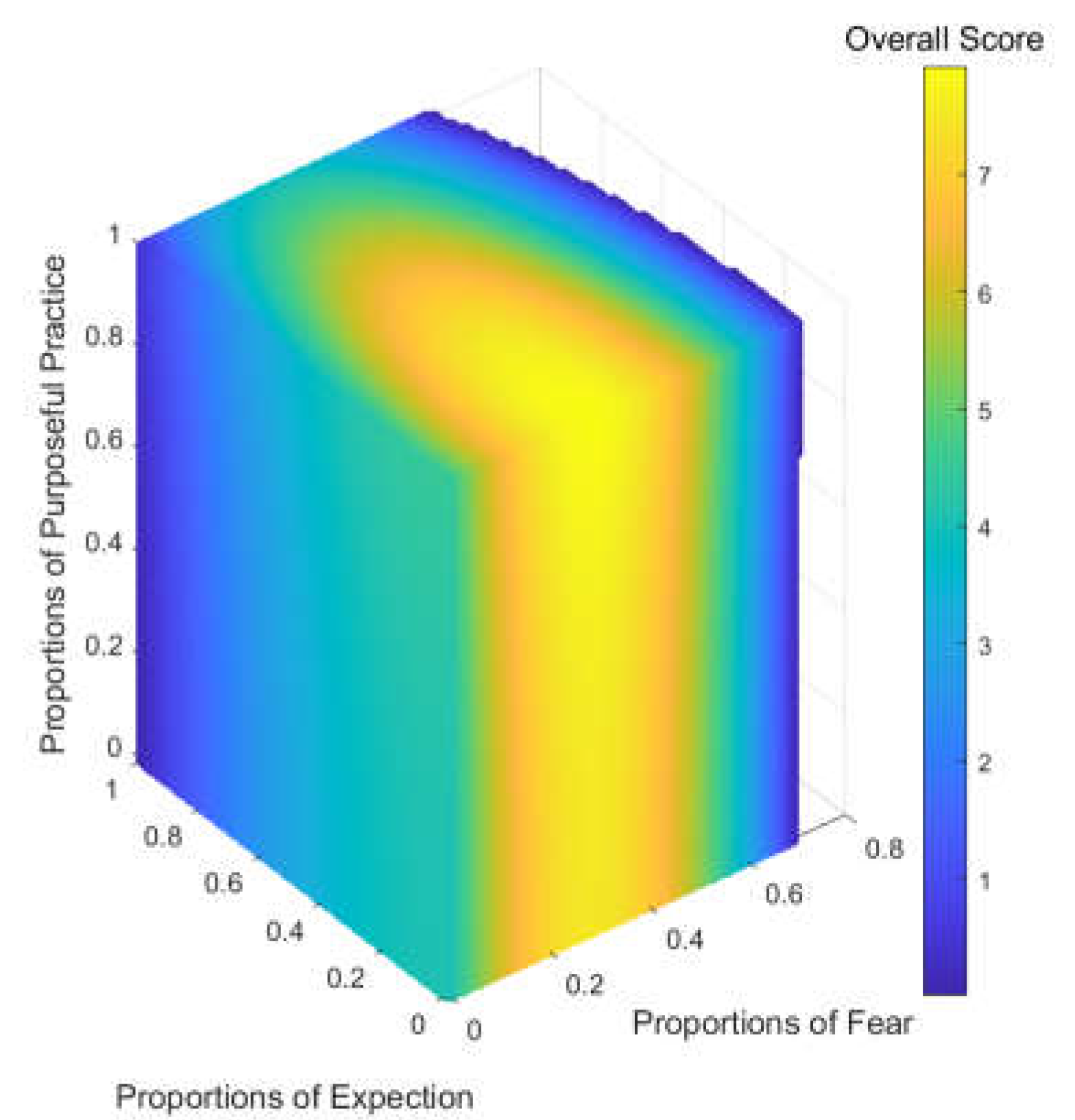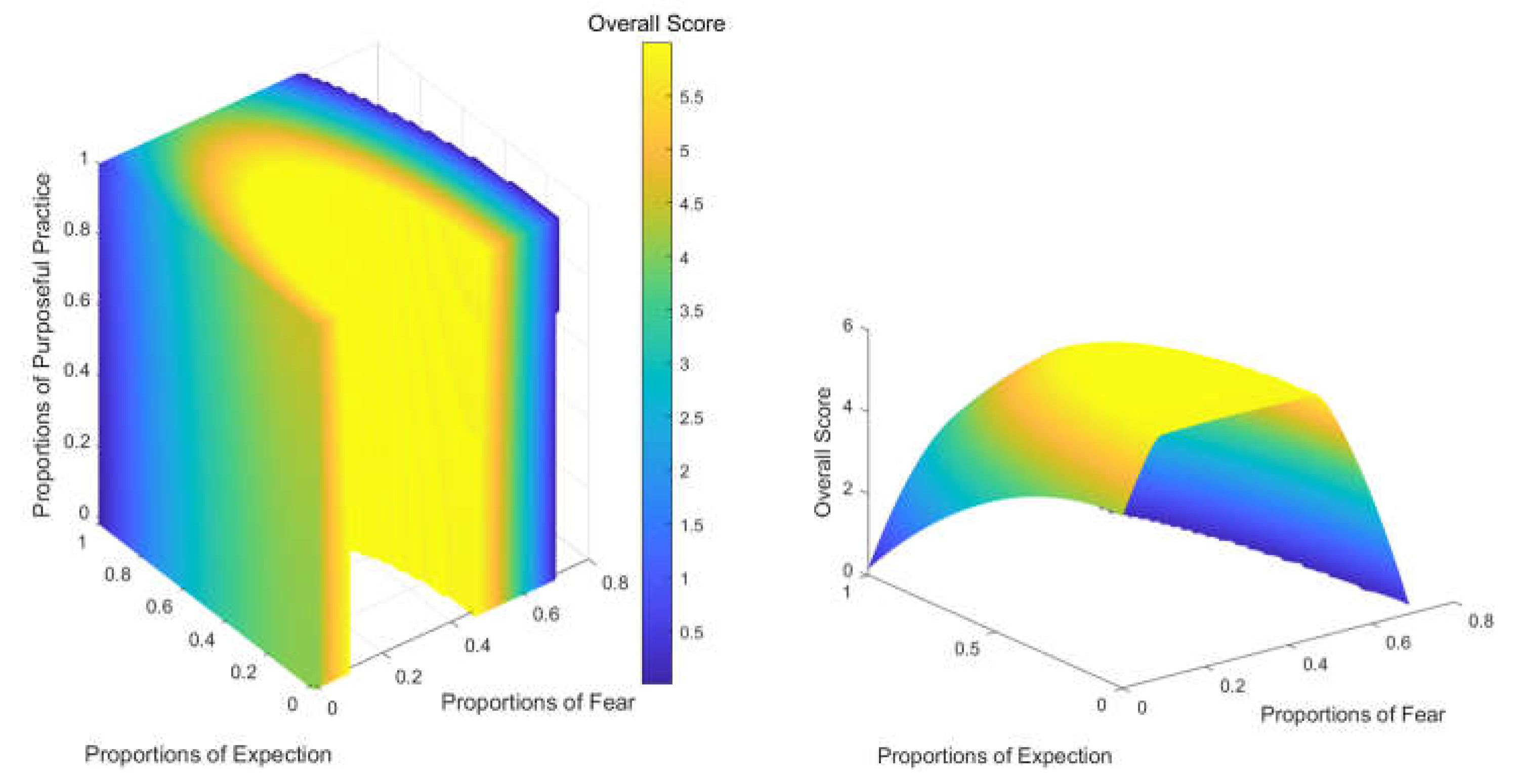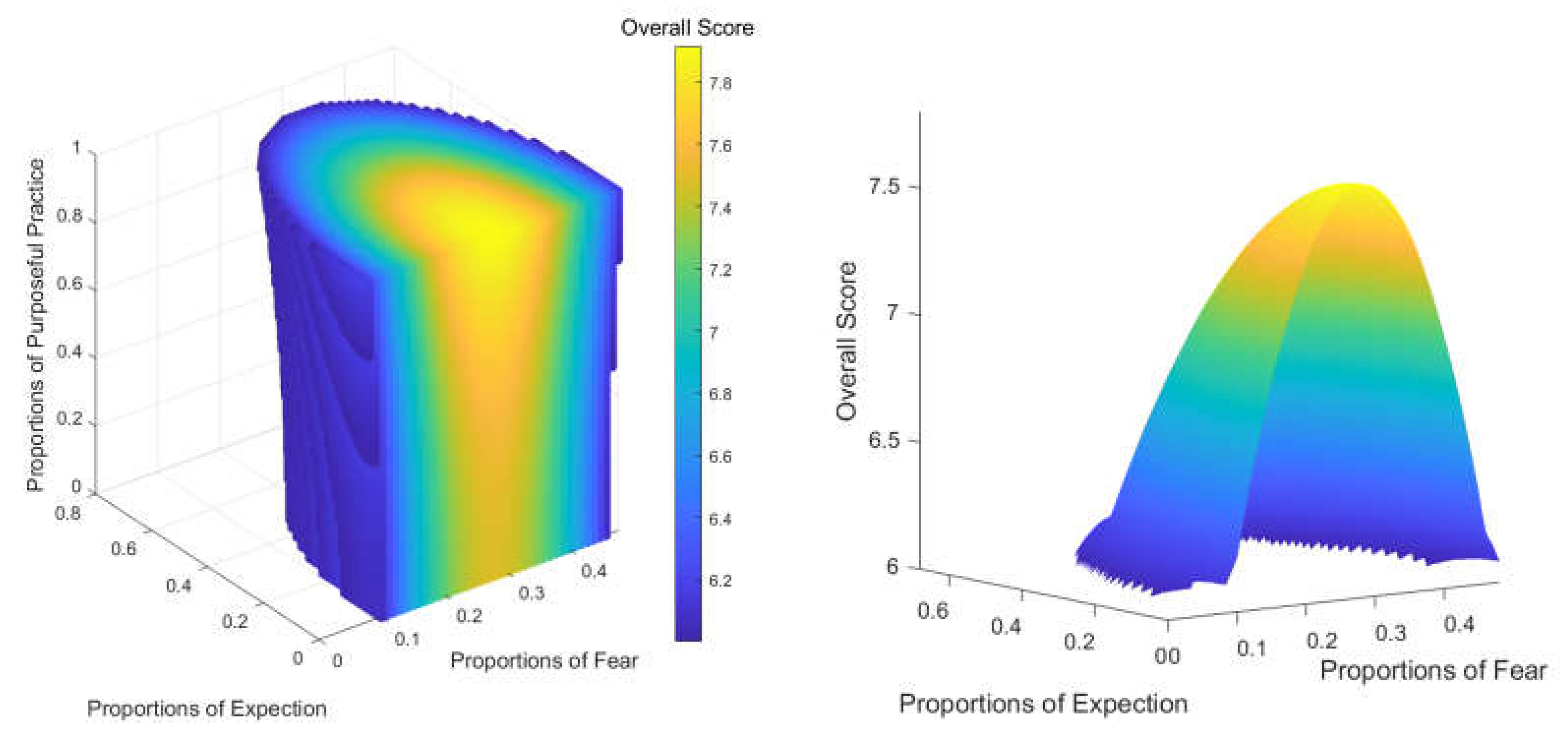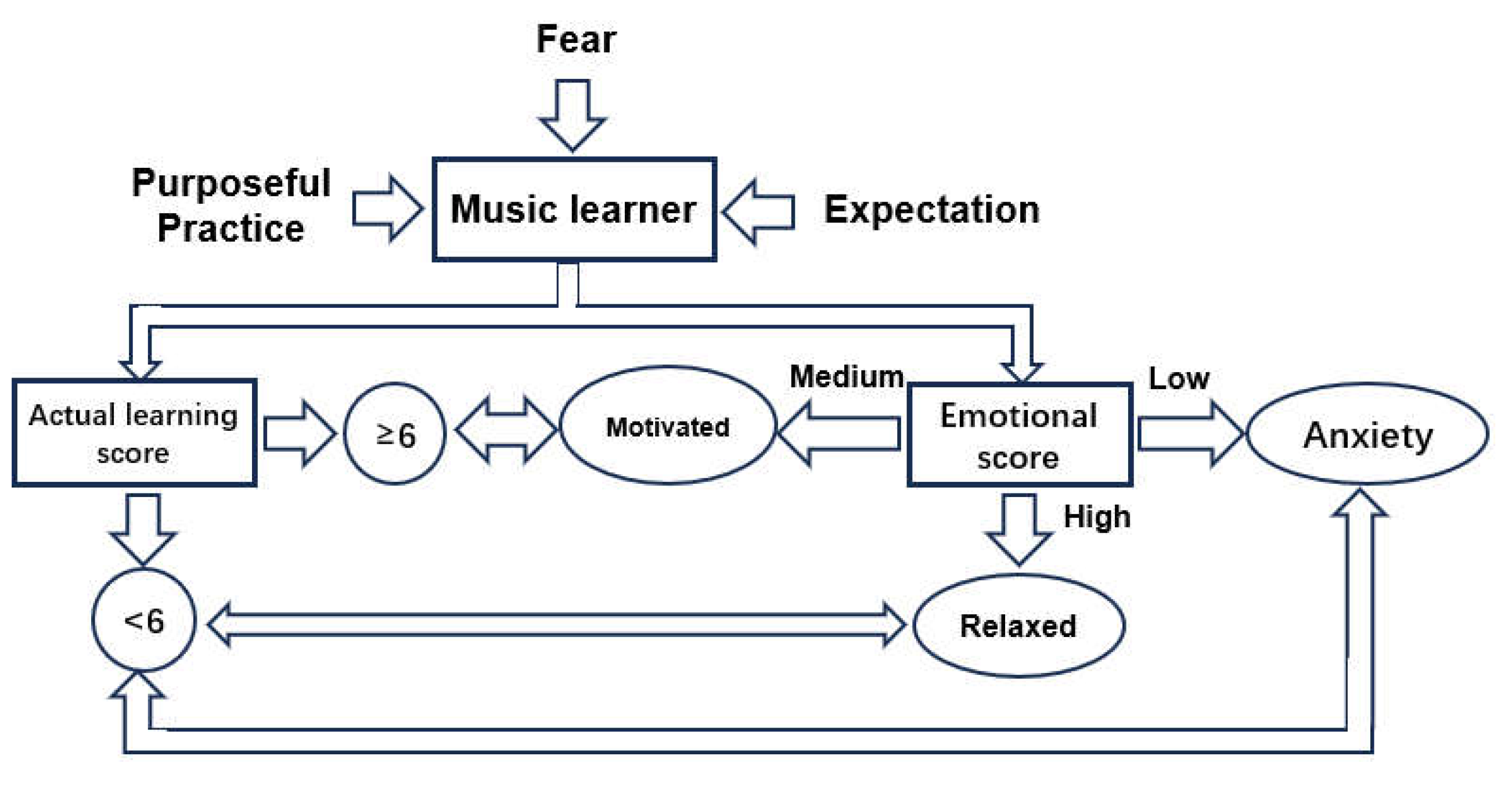1. Introduction
Music education represents a unique system, markedly distinct from other professional education frameworks, primarily due to its integration of behavioral aspects such as emotions, personality, and personal habits. These components are vital for comprehending the holistic advantages of music on cognitive development and the broader scope of music education. They particularly resonate with the exploration of interventions for MPA. Understanding these elements facilitates a deeper insight into how music education can influence emotional resilience and psychological well-being, thereby enhancing both the educational experience and performance outcomes. This holistic approach underscores the need for targeted interventions that address emotional and behavioral factors, which are pivotal in managing performance anxiety and optimizing educational strategies in music. However, despite the abundant research on sustainable music learning systems, the majority of studies remain concentrated in the field of pedagogy, predominantly viewed through the lens of educators. This prevalent focus often overlooks the nuanced and individual experiences of the learners themselves, thereby limiting a comprehensive understanding of how these behavioral factors critically influence music education outcomes. This gap underscores the necessity for targeted interventions that address MPA, thereby enhancing the effectiveness and sustainability of music learning systems [
1,
2,
3]. Research addressing learning issues is often theoretically grounded in the type of knowledge taught by teachers [
4,
5]. Unlike other disciplines, sustainable music learning not only encompasses knowledge acquisition but also involves performance and skill training. This aspect marks a significant departure from disciplines that focus solely on knowledge. In music education, psychological factors play a critical role in performance and skill training, directly influencing students' subjective experiences and learning efficiency [
6]. As a branch of arts education, the music learning system is inherently linked to the complex psychological and behavioral activities of individuals. It is imperative for researchers to delve into these psychological complexities within music learning systems to enrich the sustainable music education literature [
7,
8,
9,
10,
11,
12,
13].
Many Chinese musicians perceive sustainable music learning experiences as fraught with struggle and frustration. Several studies have investigated why children and adolescents decide to cease or continue playing musical instruments, identifying predominant factors like "repetitive training" and "dealing with mistakes" [
2,
15,
16,
17,
18,
19,
20]. Students have unique practical experiences and perceptions regarding sustainable music learning, and often, there is a notable discrepancy between the actual learning outcomes and the students' perceptions received through systematic education. Previous studies have largely neglected this discrepancy, with scant theoretical analysis from the perspective of a quantitative model system.
This gap in research highlights the need for a more nuanced understanding of how psychological interventions, specifically tailored for MPA, can mitigate these educational challenges. Addressing these issues contributes to developing more effective and psychologically aware music education strategies. Such interventions are crucial for enhancing students’ learning experiences by aligning theoretical knowledge with practical skill development and emotional management, ultimately fostering a more sustainable and fulfilling music education system. It has been shown in some study that fear of making mistakes is likely to be an important factor influencing negative learning experiences. Focusing on the field of public education, in The Fearless Classroom: A Practical Guide to Experiential Learning Environments, Joli Barker stresses that teachers should create a fearless atmosphere for students and allow mistakes to happen in the classroom [
8,
26,
27,
28,
29,
30,
31,
32]. A similar point is made in the area of mathematics; teacher Stanley P. Izen also claims that making mistakes is a necessary step in the learning process, and that teachers should guide students in how to learn from mistakes [
27,
28,
29,
30,
31,
32]. In the music field, as William Westney proposes in his book The Perfect Wrong Note, mistakes are valuable, and we need to cherish the information that mistakes are trying to impart. During the process of dealing with mistakes, he states that we need to pay attention on how our body feels [
28,
29,
30]. Once we feel the physical freedom, it will lead us to the breakthroughs [
31,
32]. In the other words, when our body feels free, we can achieve effortless playing without fear. For reaching fearless and free performance, Mildred Portney Chase presented several approaches in her timeless book Just Being at the Piano. One of the significant perspectives according to Chase is to bypass the self-conscious barrier by creating a harmony of mind and body [
33]. This was also mentioned in jazz pianist Kenny Werner’s book Effortless Mastery, in which he describes finding a quiet inner space where we can relax and have an open-minded focus; this leaves no room for fear, and flow appears [
5,
34,
35,
36,
37,
38,
39]. These views match with Timothy Gallwey’s understanding of the mental side. Through the book Inner Game of Tennis, tennis pro Timothy Gallwey reveals his own unique understanding of the concept for reaching peak performance by balancing the physical and mental sides in the process of coaching tennis [
40,
41,
42,
43,
44,
45]. This book has become a phenomenon and has been used in a variety of fields. Unlike most studies, in the quasi-autobiographical book Never Too Late, public education visionary John Holt described the effect of fear on his studies through his own experience as an adult amateur studying the flute: he loses his learning ability at the moment when he feels fear [
46,
47,
48,
49]. " This experience resonates with a significant number of Chinese students whom I have encountered, underscoring the prevalence of similar situation related to fear in the learning experience within this demographic. Universality of these issues suggests a broader concern that extends beyond individual cases, emphasizing the need for a comprehensive psychology analysis study [
50].
This study aims to explore the psychological factors influencing the music learning system, with a particular focus on MPA, employing an innovative combination of qualitative and quantitative methodologies. Initially, a questionnaire survey was conducted to identify key psychological factors affecting students within the music learning system, especially those related to performance anxiety. Subsequently, a quantitative model system was developed to specifically analyze these factors, including MPA. Additionally, a quantitative model was established to assess the actual learning outcomes of students, enabling a comprehensive and quantitative analysis of the weight ratios of specific influencing factors, such as MPA, on personal music learning systems.
This approach allows for a detailed examination of how MPA, alongside other psychological dimensions such as motivation and emotional resilience, impact music education. By integrating both subjective insights from the qualitative data and objective measurements from the quantitative analysis, this study provides a holistic view of the dynamics at play. This methodological synthesis not only enhances our understanding of the psychological underpinnings of music learning but also informs the development of targeted interventions aimed at mitigating MPA and improving educational outcomes in this field. The objective of this paper is to study the effect of psychological emotions and academic performance on music learning system based on stochastic nonlinear system.
The main contributions of this paper include the following:
1. The most significant innovation of this study is the development of a quantitative model system designed to evaluate psychological factors influencing a sustainable student music learning system, coupled with a quantitative model system for measuring actual learning outcomes. Through rigorous quantitative analysis, this model system calculates the weight values of various negative emotions on the music learning system. Such an approach to integrating emotional and psychological analysis into music education research is unprecedented and represents a breakthrough in this field. This innovative methodology allows for a nuanced understanding of the impact of negative emotions on students’ learning processes, providing valuable insights that could lead to more effective strategies for enhancing the sustainability of music education.
2. Existing research predominantly examines various factors from the perspective of teachers' instructional methods, which often highlights phased teaching states and focuses primarily on teachers' learning objectives. This approach tends to overlook the broader concept of sustainable music education and minimizes the role of students, who constitute a significant portion of the music learning community. This study addresses this gap by emphasizing a music learning system from an emotional perspective, placing students at the core of the music learning system. By doing so, the research aims to more accurately investigate the impact of emotional factors on the music learning system. This shift in focus allows for a deeper understanding of how students’ emotional states influence their learning processes and outcomes, providing insights that could lead to more effective and emotionally attuned educational practices in music.
3. The objective of this research is to introduce the concept of a stochastic nonlinear system into the realm of psychological analysis [
51,
52,
53,
54,
55,
56,
57,
58,
59,
60,
61,
62,
63], facilitating interdisciplinary integration and promoting a more profound understanding of the impact of psychological factors on music learning systems. This approach is designed to surpass traditional social surveys and research methodologies by providing a more dynamic and mathematically rigorous analysis. By leveraging the stochastic nonlinear model, the study aims to capture the complexity and variability of psychological influences, offering insights that are not only more precise but also actionable within the context of music education. This innovative methodology is expected to yield a deeper comprehension of how psychological factors, particularly those related to emotional states and anxieties, affect both the learning process and the sustainability of music education systems.
This study's emphasis on music learning system highlights a student-centric approach, prioritizing the experiences and perceptions of students as they navigate their music education journey. This perspective offers a valuable complement to existing research that often focuses more on pedagogical methodologies or institutional structures. Uniquely, this research concentrates on college level students, where the factors influencing the music learning system may vary significantly from those at other educational levels. The aim is to identify the elements that shape the music learning experiences of Chinese college students and to develop strategies that enhance their enjoyment and engagement with the music learning process.
By pinpointing these influential factors, the research promises to offer insights that can directly improve music teaching methods, curriculum design, and support systems tailored for college students. This targeted approach enriches the existing body of literature by addressing contemporary issues and trends within music education, specifically within the unique cultural and educational context of China. The study is distinguished by its focus on college students, its comprehensive exploration of diverse factors that contribute to a sustainable music learning experience, and its potential to offer contextually relevant, practical applications for music educators. Collectively, these characteristics establish the study as a distinctive and valuable addition to the ongoing research into music learning systems
2. Methodology of Survey
2.1. Participants
Drawing on previous research findings within the music learning system [
10,
15,
20,
21,
22,
30,
41,
42,
43,
44,
45], alongside insights from diverse branches of psychology and education [
35,
36,
37,
38,
42], this study has crafted a survey questionnaire incorporating several pivotal questions pertinent to the field of music learning. Notably, this survey places a significant emphasis on the psychological and emotional dimensions of music learners. It incorporates question formats from established psychological research tools, aiming to accurately capture the genuine psychological activities of music learners. This methodological approach enhances the potential to delve deeply into the emotional and cognitive processes that influence music education, aligning with the broader objectives of integrating psychological insights into educational practices.
The study sample comprised 100 individuals who participated in the research in 2023. These participants were enrolled at Hangzhou Normal University and Wuhan University of Communication in China, representing a diverse group of Chinese college music students. The gender distribution included 74 females (74%) and 26 males (26%). All participants had at least five years of music learning experience, with some having over a decade. The theoretical framework for this investigation was based on the concept of psychological needs. This perspective provides a cohesive approach to synthesizing the findings and conclusions of previous music learning system research and offers a robust explanation for the results observed in the current study. This alignment ensures that the study not only contributes to our understanding of educational outcomes but also addresses the underlying psychological dynamics influencing these outcomes.
2.2. Data Collection and Procedure
All participants were recruited within one week and administered questionnaires over the following two weeks. The importance of the study was communicated to participants, emphasizing the voluntary and anonymous of their participation.
This study developed the questionnaire outline through a comprehensive process of internal testing and external review. Subsequently, a psychologist was involved to review the interview outline and provide valuable feedback. Several music students who did not participate in the follow-up questionnaire study were invited to provide feedback. Then the questionnaire survey was established.
The questionnaire mainly adopts the form of open-ended questions. It mainly covers four aspects: (1) Basic personal information, including gender and grade of the participant; (2) Participants briefly describe their own music learning experience and give scores (3) Reasons for positive or negative music learning experience (4) How to overcome difficult times. All the data collection through online anonymous questionnaire system.
2.3. Questionnaire
1. What is your gender?
2. What grade are you?
3. Briefly describe your sustainable music learning experience and rate it from 1 to10. (1 means extremely enjoyed;10 means extremely painful.)
4. What are the elements may affect your sustainable positive learning experience?
5. What are the elements may affect your negative learning experience?
6. How did you overcome the difficulties in the process?
2.4. Data Analysis
We have got 97 answers back from 100 participants. There were 74 (76.3%) females and 23 (23.7%) males. 90 Undergraduate and 7 graduate students.
The questionnaire results indicate that half of the students surveyed reported negative experiences in sustainable music learning journey. It's interesting to note that, based on the feedback we got, there doesn't seem to be a clear difference in the distribution of participants across different academic levels in the undergraduate students. Considering that the number of graduate students participating is small (only 7 students), the conditions for grade-based differentiation analysis are not met.
By collecting the results of the questionnaire survey, the distribution of all scores was obtained, and
Figure 1 reflects this distribution.
1 point: 4 participants
2 points: 0 participants
3 points: 16 participants
4 points: 9 participants
5 points: 24 participants
6 points: 3 participants
7 points: 8 participants
8 points: 25 participants
9 points: 5 participants
10 points: 6 participants
2.5. Distribution Analysis:
The data revealed that a significant number of participants clustered around three specific ratings, potentially indicating a common sentiment within the group at scores of 3, 5, and 8. When categorizing these scores into three groups, the distribution is as follows: 29 students in the negative experience group (scores below 5), 24 students in the neutral experience group (score of 5), and 47 students in the positive experience group (scores above 5), as depicted in
Figure 2. This classification shows that nearly half of the students rated their music learning experience as positive. However, almost one-third of the participants perceived their learning experience negatively, highlighting varied student experiences and the need for further analysis into the factors influencing these perceptions.
Although the numerical summaries provide valuable information, understanding context and personal perspectives is crucial to a full analysis of participants' sustainable music learning system. Considering open ended questions can provide insight into the reasons behind certain ratings, we methodically analyzed all answers and refined the factors that appeared frequently in participants' answers as influencing their sustainable music learning experiences and their corresponding adjectives and nouns. The most effective representative reasons all have undergone rigorous statistical and classification analysis in order to conduct a more comprehensive and in-depth discussion.
3. Exploration of Quantitative Model System for Emotional Factors
Previous studies have predominantly employed quantitative methods to analyze research subjects and data from a statistical perspective. While this approach can indeed produce meaningful results, it often falls short in capturing the core elements that fundamentally explain the underlying issues of the study. This limitation highlights the need for incorporating more comprehensive methodologies that can delve deeper into the causal relationships and nuanced dynamics at play.
This paper innovatively explores the quantitative impact of emotional factors, particularly MPA, on music learning system by constructing a quantitative model system. This approach facilitates a detailed analysis of survey questionnaire results across various emotional dimensions, including MPA. By correlating the data with actual music learning outcomes, the study fits a sustainable music learning model system. This model not only quantifies the impact of MPA but also offers insights into the key parameters that influence music learning and education significantly. Through this model, educators can better understand how anxiety affects students' learning processes and outcomes, enabling the development of strategies to mitigate its negative effects and enhance the overall effectiveness of music education.
The analysis of the survey questionnaire results indicates that the reasons for the negative experiences described by participants were strikingly similar across all groups, including those in the score 8 group, which had the largest number of respondents. Common reasons contributing to their frustration during the learning process included a fear of making mistakes and judgment from instructors, as well as the pressure of high expectations. Notably, these factors are often exacerbated by MPA, a significant emotional stressor in music education.
To quantitatively understand these emotional factors, including MPA, a model system analysis is conducted. Initially, it is essential to assign specific values to each factor, and establish corresponding value ranges that reflect the actual research conditions and the logical characteristics of the music learning system. Through this quantitative analysis, we aim to uncover the root causes of negative experiences and identify learning gaps within the music learning system. This approach will allow us to explore the influence of MPA and other factors, and develop targeted solutions to enhance the learning experience and mitigate the negative impacts associated with these emotional stressors.
Parameter Setting of Emotional Factor Quantification Model System
Setting a value range can combine the emotional quantification model system with the final results of the survey questionnaire for data-driven matching. This approach cleverly transforms the scoring strategy of the questionnaire into an analysis of the quantitative model, which helps to identify the underlying emotional logic that influences music education. This study fits the emotional model obtained through scoring into a nonlinear state space system [
51,
52,
53,
54,
55]. By synthesis and linear fitting of independent and dependent variables, a set of linearized quantitative system models can be obtained as follows
where
, set
to represent feel proportions of fear,
to represent feel proportions of expectation, and
to represent feel proportions of purposeful practice.
and
are the system states of sustainable music learning model system, the control input and the measurable output of the system;
is the high-order of the systems, and
is defined as in (1);
is the unmeasurable state vector.
represents the emotional score result of the survey questionnaire and range of values (output negative factors) is
,
represents the model errors caused by other reasons (Other factors beyond the three). Meanwhile, we set
as the actual music learning score of a certain student. And through proportional operation, its value range is also controlled within the range of 0 to 1, which helps in the construction of emotional quantification models. Finally, the comprehensive score
is obtained by fitting the emotional score
and academic performance score
by using the least squares method.
4. Design of a Quantitative Model System for Emotional Factors
According to the survey results, the most frequently cited factors contributing to a positive learning experience include effective practice and gaining a sense of accomplishment. Interestingly, these factors directly correspond to those identified in negative experiences. High efficiency in practicing piano effectively counters the fear of making mistakes, while a sense of accomplishment alleviates frustration associated with not meeting expectations. This relationship is clearly illustrated in
Figure 3, which demonstrates how positive and negative experiences are influenced by these critical factors in music learning. This insight highlights the importance of addressing both efficiency in practice and emotional responses to achievement in order to enhance the overall quality of the music education experience.
4.1. Fear Anxiety
A significant proportion of students reported a pervasive fear of making mistakes and facing judgment from peers or instructors. Notably, the word “fear” appeared in the descriptions provided by 82.4% of students; within the negative experience group, 87.5% considered this fear the largest barrier to sustainable music learning. Such fears may inhibit their willingness to take risks, experiment with new techniques, or freely express themselves in their musical endeavors. A detailed analysis of the questionnaire results for each student revealed the data distribution outlined in
Figure 4. This analysis underscores how prevalent and influential fear is among students, significantly impacting their engagement and progress in music education.
According to the principle of proportionality in data analysis, and based on specific emotional factors, we have selected several representative students to answer and express in proportion.
Negative experience group:
S2: I do not like playing the piano because I'm afraid of making mistakes.
S47: I'm afraid of playing the wrong note. I stop a lot during the playing and it's hard to enjoy.
S71: I’m afraid of having lessons, and I’m afraid that I’ll be criticized by the teacher if I don’t make progress. I hate practicing, and practicing is so tiring.
S93: Always making mistakes, cannot practice well, hate practicing, and afraid of being criticized.
Neutral experience group:
S24: Afraid to having lesson because I’m afraid of playing something wrong in the lesson.
S59: Frequent mistakes made my fingers stiff, and I was afraid to have a lesson with teacher.
Positive experience group:
S35: I am afraid of learning new piece because I’ll make a lot of mistakes. But once I have learned piece, I will start enjoying playing it.
S67: I do not like making mistakes, I hope I can play the piece perfectly, but I know that is impossible.
According to the principle of proportional expansion, this article fits a scatter plot of the impact of a single factor (Fear) on emotional score
as follows (see
Figure 5)
Dealing with mistakes is an essential aspect of the learning experience. However, many students and musicians, including those from the positive experience group, often try to avoid making mistakes due to the feelings of embarrassment and shame associated with them. This behavior is frequently intensified by MPA, which compounds the fear of making errors. In the book The Perfect Wrong Note, William Westney emphasizes the positive value of mistakes. He argues, "Honest mistakes are not only natural, they are immensely useful [
26,
27,
28,
50]. They are truthful and pure, filled with specific information, and they provide immediate, clear insights into our current capabilities and the next steps required for improvement. This is why a particular wrong note can indeed be thought of as perfect" [
3,
24,
25,
26,
27]. Westney's insights suggest that addressing MPA and reframing the perception of mistakes can significantly enhance the learning process, allowing students to engage more honestly and productively with their musical education.
Understanding how to handle mistakes is crucial for musicians, particularly in the context of cognitive psychology, which plays a pivotal role in elucidating how individuals perceive and react to the fear of making mistakes. This fear, often exacerbated by MPA, involves several cognitive processes, including cognitive appraisal, cognitive distortions, self-efficacy beliefs, and attribution processes. For instance, children learning to walk fall repeatedly without embarrassment or negativity, in an environment free of judgment. This illustrates that failure is a natural and essential step in the learning process, requiring time for mastery.
However, for adults, and especially musicians, judgment often accompanies momentary failures or simple mistakes. This judgment can lead to a cycle where necessary learning time is forgotten, and failures are prematurely met with self-blame before achieving success. Once judgment enters the scenario, it triggers a vicious cycle that worsens the situation, significantly fueled by music performance anxiety. Timothy Gallwey, author and developer of a new model for success, emphasizes that forming a self-identity based on negative judgments can lead to role-playing, which obscures one's true potential. This condition highlights the importance of managing the cognitive and emotional responses to mistakes within the stressful context of music performance, where anxiety can significantly impact both learning and performance outcomes. Musicians often become what they believe themselves to be, underscoring the need to reframe perceptions of mistakes and address MPA effectively.
In music education, individuals engage in cognitive appraisal to assess situations and evaluate their own abilities, particularly in determining the significance of making mistakes during performances or practice sessions. Negative appraisals, such as viewing mistakes as catastrophic or indicative of personal failure, can significantly intensify fear. Additionally, cognitive distortions—irrational thoughts or beliefs that contribute to negative emotions—often manifest in musicians. Examples include overgeneralization, where one believes a single mistake ruins an entire performance; catastrophizing, or imagining the worst possible outcome; and personalization, attributing errors to personal inadequacy. These distortions exacerbate the fear of making mistakes.
Moreover, musicians with low self-efficacy may view mistakes as reflections of their incompetence, further intensifying this fear. It is common for musicians to experience moments of self-doubt, feeling they are not smart or skilled enough, often stemming from a single error. On stage, performers might believe that a mistake tarnishes the beauty of the entire piece, even though audiences are generally forgiving of such errors. This exaggeration of one's mistakes compared to others is often a result of a judgmental mindset that distorts reality.
The simple fact of playing a wrong note is compounded by self-doubt and judgment, which are self-inflicted. Timothy Gallwey argues that ending judgment involves neither adding nor subtracting from the facts [
32,
33,
34,
35]. Initiating self-judgment distorts these facts and adds questionable interpretations to events, thereby reinforcing negative cycles of thinking and performance anxiety. By understanding and addressing these cognitive distortions and self-judgment, musicians can foster a healthier, more realistic approach to dealing with mistakes, ultimately reducing the psychological burden of performance anxiety.
4.2. Expectation
Another prevalent factor contributing to negative experiences among music students is the high expectations they set for themselves. The data indicates that when students fall short of their self-imposed goals, they often experience significant frustration. By meticulously analyzing the questionnaire data for each student individually, we have obtained a detailed data distribution, which is presented in
Figure 6. This analysis provides clear insights into the correlation between high personal expectations and the emotional responses of students when these expectations are not met. Understanding this relationship is crucial for developing strategies that help students set realistic goals and manage their expectations, thereby mitigating frustration and enhancing their overall learning experience.
According to the principle of proportionality in data analysis, and based on specific emotional factors, we have selected several representative students to answer and express in proportion.
Negative experience group:
S4: I am always a slow learner, and I always make mistakes, unable to meet the goal.
S19: There has been no progress for a long time. I am always very slow in reading music and cannot master new skills.
S53: My progress in practicing piano is slow, I always fall behind other students.
S82: I practiced each measure seriously for a long time but still couldn't get it right. My fingers couldn't keep up with my brain, and my muscles weren't flexible enough to meet the requirements of the piece.
Neutral experience group:
S12: The early stage of learning music is a bit difficult, but it gets better later.
S76: Reading music is painful.
Positive experience group:
S51: I always play poorly in front of the teacher, and I feel like I will fail when I go on stage.
S84: It’s disappointing when you can’t play it well no matter how hard you practice.
According to the principle of proportional expansion, this article fits a scatter plot of the impact of a single factor (Expectation) on emotional score
as follows (see
Figure 7).
Many research in expectation field is focused on explore the origins and nature of these high expectations, as they might stem from external pressures or internal perfectionism. However, from the data collected, students are still feeling frustrated even they are not chasing the perfection. Bandura's Social Cognitive Theory emphasizes the role of self-efficacy, the belief in one's ability to succeed in specific situations [
46,
47,
48,
49,
50]. High expectations may be linked to high self-efficacy, but unrealistic expectations can lead to a mismatch between perceived ability and actual performance, resulting in frustration. Implementing strategies to manage expectations, providing realistic goal-setting guidance, and promoting a growth mindset could mitigate frustration and enhance the overall learning experience.
Goal setting is a well-established area in educational psychology, notably explored through Locke and Latham's Goal Setting Theory. This theory posits that specific and challenging goals lead to higher performance compared to vague or easy goals [
6,
7,
8,
9,
10,
45]. Analysis of the data reveals that students' expectations are often simplistic or ill-defined, with comments like “I am always a slow learner,” “My progress in practicing piano is slow,” or “My fingers couldn't keep up with my brain, and my muscles weren't flexible enough to meet the requirements of the piece.” These statements underscore the importance of setting clear and specific goals.
Specific goals provide individuals with a clear direction and a well-defined target, offering clarity on what needs to be achieved and reducing ambiguity. For instance, setting a goal such as, “To be able to play this phrase in tempo 72 without stopping,” directs effort and attention precisely and effectively. However, simply setting clear goals is insufficient to alleviate frustration during the learning process. As students work towards these goals, it is also crucial to simplify each objective into manageable steps, allowing focus on one aspect at a time. This concept aligns with Peter M. Gollwitzer's "Implementation Intentions," which demonstrates that such intentions strongly enhance goal achievement by converting goal intentions into actions. Gollwitzer describes goal intentions as instructions individuals set for themselves to perform specific behaviors or achieve desired outcomes.
By focusing on completing each goal one step at a time, students can progress naturally and effortlessly, avoiding the frustrations and struggles associated with multitasking. This approach not only boosts their self-esteem but also motivates them to undertake and conquer increasingly challenging tasks.
Understanding what to expect from the learning process is essential for musicians. While setting goals is crucial, harboring expectations of success at every turn is unrealistic and can hinder progress. During the learning journey, students will inevitably encounter mistakes and challenges, with outcomes varying between failure and success. Constant focus on results can heighten emotional responses and obstruct the learning process. Therefore, rather than maintaining high expectations for outcomes, students should cultivate an open mind, prepared to accept whatever arises in the moment without judgment. Honest feedback during play reveals the true state of a student’s progress and is indispensable for recognizing the actual extent of improvement needed and identifying real problems along with their solutions. Curiosity and constructive feedback are vital as they help students discern how to enhance their performance compared to previous attempts.
Mildred Portney Chase eloquently captures this sentiment, stating, “You may come to a learning situation with expectations but without self-acceptance.” She further explains, “If we do not expect to have knowledge at the outset, we are open to the desire to know, explore, discover, and grow. If we can simply accept where we are at the moment, then we are freed from self-condemnation” [
31,
32,
33,
34,
35,
36,
37,
38]. This perspective emphasizes the importance of self-acceptance and the readiness to embrace learning as an ongoing process of discovery and improvement.
4.3. Purposeful Practice
The analysis of our data reveals significant attitudes towards practice among different student groups: 86.2% of students in the negative experience group perceive practicing as boring and overly time-consuming. Similarly, 70.8% of students in the neutral experience group and 55.3% in the positive experience group reported struggles during practice sessions. This highlights a prevalent issue in music education: despite widespread recognition of practice as essential for musical mastery, effective practice methods are often not adequately addressed. The paradox emerges as students grapple with uninspiring and time-consuming practice sessions, leading them to question the fundamental value of this crucial aspect of musical training. This misconception that practice must inherently be tedious and strenuous contributes to a lack of enthusiasm and engagement among many aspiring musicians. In response to this challenge, the concept of purposeful practice offers a transformative learning methodology. Purposeful practice, characterized by its intentionality, focus, and efficiency, demystifies the art of practice and makes it more engaging and productive. By conducting a detailed analysis of questionnaire results from each student, we have compiled a distribution of these perspectives, illustrated in
Figure 8. This analysis underlines the need to redefine practice strategies to foster motivation and enhance overall effectiveness, ultimately improving the music education experience.
According to the principle of proportionality in data analysis, and based on specific emotional factors, we have selected several representative students to answer and express in proportion.
Negative experience group:
S6: Practicing is so boring.
S28: It always takes a long time to practice piano and I feel very tired.
S42: The progress of practicing is very slow. It has been a long time, but the progress is not obvious.
S64: I always get distracted when practicing the piano.
S89: Sometimes, even if you practice a few measures for a long time, you won't be good at it, and even you did it in the end it may not keep the same at next day.
Neutral experience group:
S22: Practicing takes a lot of time, and I would not practice when I’m busy.
S49: Practicing piano is always very hard.
Positive experience group:
S31: Practicing is always difficult when you can't find a way.
S67: Practicing is inherently boring, so it’s understandable that you just have to endure it.
According to the principle of proportional expansion, this article fits a scatter plot of the impact of a single factor (Purposeful Practice) on emotional score
as follows (see
Figure 9).
Many participants associate practicing with spending extensive amounts of time in the practice room; however, mere quantity is not the primary driver of effective practice. Instead, quality and efficiency are essential components that contribute significantly to successful outcomes. Achieving effective practice necessitates that each step in the learning process is purposeful. The concept of purposeful practice, popularized by psychologist Anders Ericsson, defines this as a focused, intentional form of practice specifically aimed at improving performance. This type of deliberate and structured practice profoundly influences students' learning experiences.
Purposeful practice is characterized by its emphasis on efficiency. Students are encouraged to identify their weaknesses, set specific goals, and engage in targeted exercises designed to address those areas. Such efficient practice methods can lead to more substantial improvements in a shorter amount of time, thereby positively affecting students' perceptions of their music learning experience. This approach not only enhances their skills but also boosts their confidence and motivation, transforming practice from a daunting task to an empowering activity. As students experience tangible progress through purposeful practice, their confidence in their abilities is likely to grow. Success in targeted areas reinforces a positive self-perception, creating a sense of competence and mastery. This, in turn, contributes to a more positive and fulfilling learning experience.
As mentioned above at expectation section, setting clear and achievable goals also important to the purposeful practice. This process of goal setting provides students with a roadmap for their musical development. Attaining these goals becomes a source of motivation and accomplishment, shaping a positive learning environment. Purposeful practice encourages adaptability by focusing on addressing specific challenges. As students encounter new difficulties or areas for improvement, they learn to adapt their practice strategies to meet evolving needs. This adaptability contributes to a dynamic and responsive learning experience. By incorporating purposeful practice into the practice routine, students can enhance the effectiveness and meaningfulness of their learning experiences, ultimately contributing to their growth as musicians.
In "Intelligent Music Teaching," Robert A. Duke outlines essential elements for music educators, covering topics such as what to teach, assessment, sequencing instruction, feedback, and more [
26,
27,
28,
50]. His exploration of teaching methodologies presents numerous strategies that are particularly relevant for purposeful practice, reinforcing the idea that practice is an act of self-teaching. In the chapter "What to Teach," Duke emphasizes the importance of setting specific goals for learners, advocating for goal setting as a key strategy to enhance practice efficiency.
In the realm of piano learning, he distinguishes between long-term and short-term goals. For instance, a long-term goal might be to play the first movement of a sonata smoothly. This can be effectively achieved by subdividing it into manageable short-term goals, thus facilitating a more structured and achievable practice routine. The proper alignment of these goals is crucial; inappropriate goals can make practice tedious or overly challenging.
The ability to set sensible goals is instrumental in managing time effectively and maintaining the right pace during practice sessions. Goals are dynamic; they should be continually reassessed and adjusted as necessary during practice. Assessment plays a critical role in this process, serving as a tool to accurately gauge one's current position in the learning trajectory. Duke notes that assessment is essentially about "finding out," while feedback and grading are about "communicating what you've found out." Following assessment, important decisions need to be made regarding the modification of goals, especially short-term ones.
Adjusting goals leads to strategic planning, akin to Duke’s concept of "sequencing instruction." This is a common practice among music teachers who guide students through the learning process step by step. In purposeful practice, this planning responsibility shifts to the individual, requiring careful thought to ensure that each step is logically connected and directly contributes to the ultimate goal. Strategic adjustments to the plan—whether it involves advancing, skipping, or revisiting steps—are crucial to eliminate unnecessary detours and optimize progress toward objectives. Ultimately, every action in this self-guided journey should serve the overarching purpose, emphasizing efficiency and the avoidance of wasting time on activities that do not align with the set goals.
4.4. Emotional Quantification Model System Results
According to the fitting results of the three independent emotional variables on the emotional score
, Choosing Lyapunov function [
56,
57,
58,
59,
60]
, applying
,
,
, it can be concluded that
This indicates that the model has a high degree of fit, and
-tests were conducted on each variable, with
-values all less than zero, indicating a significant impact [
61,
62,
63,
64,
65,
66]. Finally, the fitted emotional quantification model is
5. Design of a Quantitative Model System for Actual Music Learning
The emotional analysis derived from the questionnaire responses provides insights into the factors influencing sustainable music learning and education. However, these analyses are based on the subjective perceptions of each student, introducing a level of uncertainty. To gain a deeper understanding of the underlying mechanisms by which emotions impact sustainable music learning, we sought to obtain the actual music learning scores of each surveyed student. These scores, which are relatively easier to access, offer a more objective metric to evaluate the real effects of emotional dynamics on learning outcomes. This approach allows for a more robust analysis, bridging subjective emotional assessments with tangible academic performance.
It should be noted that the emotional scores obtained through survey questionnaires do not necessarily correlate with students' actual music learning performance. For instance, a student might rate their emotional experience in music learning as a perfect 10 on the survey, yet their actual academic performance might reflect a much lower score. This discrepancy highlights the potential for subjective bias in self-assessments and underscores the complexity of accurately linking emotional well-being with educational outcomes. This observation calls for a more nuanced approach to interpreting survey data, suggesting that additional methods of assessment may be necessary to fully understand the impact of emotional factors on music learning performance.
Based on the above analysis, this article sets
as the actual sustainable music learning score of each surveyed student, and converts it into a value range between 0 and 1 through proportional quantification. Similar to the method in the third and fourth sections, we can also fit the scatter plot of individual factors on the learning score
. Due to the continuation of the mathematical methods and logic in Chapter 4, the fitting process will not be elaborated here. The scatter plot of individual factors on learning scores can be obtained as follows (see
Figure 10,
Figure 11 and
Figure 12).
According to the fitting results of the three independent emotional variables on the emotional score
, Constructing the 2nd Lyapunov function [
55,
56,
57,
58,
59,
60]
. It can be concluded that
This indicates that the model has a high degree of fit, and
-tests were conducted on each variable, with
-values all less than 0.05, indicating a significant impact. Finally, the fitted emotional quantification model is
6. Design of a Comprehensive Score Quantification Model System
The comprehensive score is obtained by fitting the emotional score and academic performance score . is multiple nonlinear regression model which is still includes three emotional parameters: feel the proportions of fear ; feel the proportions of expectation , feel the proportions of purposeful pratice ; errors caused by other reasons .
We conduct nonlinear regression analysis by combining independent and dependent variables, with the variable set as a quadratic equation. The final nonlinear regression model is preliminarily determined as:
By using nonlinear regression mathematical tools to fit the data obtained from the questionnaire survey with actual music school grades, the final nonlinear model is obtained as follows:
Similarly, the scatter plot of a single factor's impact on the comprehensive score nonlinear model
can be obtained as follows (see
Figure 13,
Figure 14 and
Figure 15).
7. Discussion
This study constructs quantitative model system for emotional factors and actual learning effectiveness factors in music learning system, and then obtains an overall quantitative model through data fusion technology. This research method has been rarely used in previous studies, which is also a novelty and originality of this study. Its characteristic lies in explaining from a data perspective how certain emotional factors affect the actual effectiveness of music learning system.
Based on the model simulation results of the overall fusion system, determine the comprehensive impact of three factors on the comprehensive score model system. For the consideration of data reliability, this study used data model system simulation techniques to obtain the different effects of multiple factors in different intervals on the comprehensive sustainable music learning score, and quantitatively analyzed them.
The quantitative model of the data presents a distribution chart of interval scores between different scores range, as shown in the following
Figure 16,
Figure 17 and
Figure 18. It presents the quantitative impact of three main emotional factors on music learning system.
Figure 16 shows the different quantitative effects of three emotional factors within a larger range on the overall score of integrated music learning system. It can be intuitively observed that the three emotional factors have different degrees of impact on learning, while the factor of " purposeful practice " has no significant impact on the overall score of music learning system, while the other two have some significant differences in the impact on individual music learning. Based on the above analysis, it is necessary for this study to narrow the range of score values and focus on the subtle effects of emotional factors “fear” and “expectation” on music learning system. It separated two factors that have a significant impact on sustainable music learning system and quantitatively analyzed their impact on music learners in a relatively small area (see
Figure 17 and
Figure 18).
It considers a comprehensive score greater than 6 as qualified [
7,
39,
48]. Analyzing the research results of previous research, this study quantitatively assigns values to ideal music learning system, which helps to extract relevant ideal innovations from the data results. Based on the simulation results of model system, we can determine the comprehensive impact of emotional factors on the overall score. Furthermore, we can analyze the proportion of the three emotions within the optimal range of qualified scores. The model graph shows that expectations and fears have a significant impact on overall scores. When the influence range of these two factors is kept between 0.1 and 0.4, the overall comprehensive score is higher, which can ensure both emotional stability and continuous improvement of one's own music level. As a source of emotional factor scores, this study obtained them through a questionnaire survey, and this method is particularly reasonable and universal, which has been confirmed by various previous studies.
The concept of psychological needs served as the theoretical framework for this investigation, providing a cohesive means to unify and interpret the findings of music learning experience research, particularly in relation to MPA. This study effectively integrated the results of emotional surveys focused on MPA with actual learning outcomes, identifying a series of factors that influence sustainable music learning through the use of weighting methods. Additionally, the approach facilitated the discovery of interrelationships among different factors, including the impact of MPA, and determined their weighted impact values on the overall fusion score, as depicted in
Figure 19. This methodology underscores the intricate dynamics between psychological needs and music learning, offering enhanced insights into how music performance anxiety contributes to educational outcomes.
Fear, expectation, and misconceptions about practice are principal elements that affect the music learning system, often exacerbated by MPA. Musicians frequently encounter situations that can provoke anxiety, such as performing on stage, playing for teachers, or facing their own technical weaknesses. Understanding and addressing the root causes of this anxiety can empower musicians to find effective methods to overcome it. Every musician deserves to experience joy in a sustainable learning process and to play music freely. For students, thorough and solid preparation is crucial in overcoming fear and anxiety. During this preparation phase, pinpointing specific problems and setting a non-judgmental mindset are essential. This approach allows students to accurately assess their current abilities and challenges within the learning process. With clear goals set, targeted, focused practice can then transform from a source of stress into an engaging, problem-solving activity. This method not only helps alleviate the typical frustrations and upset associated with mindless practice sessions but also mitigates the impacts of music performance anxiety. By adopting these strategies, students can enhance their learning experience, allowing for progress that is both confident and joyful.
This study quantitatively explores the nuanced relationship between emotional factors, and the music learning system. By employing system modeling and data analysis, it further elucidates the impacts of these emotional factors. The findings highlight the critical importance of creating a supportive and non-judgmental learning environment to alleviate MPA and enhance the overall music learning experience. For teachers, actively modeling both physical and mental processes can deepen students’ understanding of the instructions and help them manage their performance anxiety. Enhancing students' self-awareness is crucial, enabling them to translate theoretical knowledge into practical skills while recognizing and addressing their anxieties. Creating a safe atmosphere where students can display their weaknesses and acknowledge their mistakes without fear or embarrassment is paramount. This approach helps in reducing the anxiety associated with performance and learning. Additionally, fostering a trusting relationship significantly improves communication between teachers and students. The consistency of teachers' words and actions greatly influences their credibility; inconsistencies can erode trust, leading students to doubt the reliability of their instructions and potentially exacerbating anxiety.
These strategies are aimed at empowering students to play without fear, discover moments of genuine joy within the learning process, and effectively manage their music performance anxiety. This holistic approach not only improves individual student outcomes but also cultivates a healthier, more engaging educational environment that supports both emotional well-being and musical achievement.
8. Conclusions
In the field of music learning research, the diversified processing modes of data ultimately support the development of educational theories and provide the necessary practical backing and a robust theoretical foundation for proposing new theories on sustainable educational systems. This research offers valuable insights into the complex dynamics shaping the music learning system landscape for college students in China, setting the stage for targeted interventions and enhanced pedagogical practices. Additionally, it facilitates opportunities for cross-cultural comparisons. The findings underscore the critical importance of addressing psychological factors, particularly MPA, that significantly influence music learning experiences. Effective strategies to mitigate the fear of making mistakes, manage high expectations, and reduce judgment from instructors can be integrated into the music learning system. Such strategies are crucial in fostering a focused and supportive learning environment that diminishes anxiety and enhances student engagement.
Moreover, implementing mentorship programs, providing emotional support, and fostering a culture of collaboration rather than competition could lead to a more inclusive and positive learning environment. By addressing MPA alongside these factors, educators and institutions can significantly improve the overall well-being and satisfaction of their students, thereby enhancing their pursuit of musical excellence. This comprehensive approach not only benefits individual learners but also contributes to the advancement of the broader educational context, promoting a healthier, more supportive atmosphere for confronting and overcoming MPA.
This study is pivotal in illuminating the complex interplay of psychological factors within the realm of music learning experiences, with a particular focus on MPA among college students in China. The insights derived from this research offer a nuanced understanding of both the challenges and opportunities within the music learning system, setting the stage for the development of more effective and student centric teaching methods. By identifying fear, expectations, music performance anxiety, and misconceptions as key elements influencing learning experiences, this study provides a solid foundation for targeted interventions and enhancements in educational practices. The practical applications of this study are manifold. Educators and institutions can leverage these findings to tailor their teaching approaches, incorporating strategies specifically designed to address the psychological aspects identified, including MPA. Initiatives aimed at reducing fear and anxiety, providing mentorship, and fostering a collaborative culture can significantly contribute to creating a more positive and inclusive learning environment. Furthermore, the emphasis on purposeful practice and the management of expectations offers actionable insights for refining curriculum design and teaching methodologies, helping students to better manage their anxiety.
As a foundation for future research, this study opens avenues for further exploration of additional psychological factors and their impacts on music learning. Subsequent investigations could delve deeper into the efficacy of specific interventions targeting music performance anxiety, potentially leading to the development of evidence-based frameworks for optimizing the sustainable music learning experience. Comparative studies across different cultural contexts or educational settings could further enrich our understanding of the universality or specificity of these psychological factors, enhancing the global applicability of the findings and fostering a broader application of best practices in music education.
In conclusion, the value of this study extends beyond its immediate application in enhancing sustainable music learning systems; it also holds significant potential to inspire and guide future research endeavors. The quest to unravel the complexities of psychological influences on music learning, particularly MPA, is an ongoing journey. This research lays a robust foundation for further exploration and refinement of educational practices within the evolving landscape of music learning systems. By specifically addressing how MPA affects music education, this study paves the way for developing more effective and empathetic teaching methods that can help students manage their anxieties and excel in their musical pursuits. Thus, it contributes significantly to the field of music education research, promising to influence both current practices and future studies.
Author Contributions
Author has read and agreed to the published version of the manuscript.
Funding
This research received support from Hangzhou Normal University Talent Introduction Initiation Funding (4195C50221204106).
Institutional Review Board Statement
Ethical review and approval were waived for this study due to the survey conducted in the public education environment and not involving human experiments.
Informed Consent Statement
Informed consent was obtained from all the subjects involved in the study.
Data Availability Statement
All data generated or analyzed during this research are included in this paper.
Conflicts of Interest
The authors declare no conflict of interest.
References
- Simmons, Amy L., and Robert A. Duke. 2006. Effects of Sleep on Performance of a Keyboard Melody. Journal of Research in Music Education 54: 257–69. [CrossRef]
- Colzato, Lorenza S., Ayca Ozturk, and Bernhard Hommel. 2012. Meditate to Create: The Impact of Focused-Attention and Open-Monitoring Training on Convergent and Divergent Thinking. Frontiers in Psychology 3.
- Bechara, A., Damasio, H. and Damasio, A. R. 2003. Role of the amygdala in decision-making. Annals of the New York Academy of Sciences, 985: 356-369. [CrossRef]
- Duke, Robert A. 2015. Intelligent Music Teaching: Essays on the Core Principles of Effective Instruction. Austin, TX: Learning and Behavior Resources.
- Allen, P. A., Kaut, K. P., Baena, E., Lien, M.-C. and Ruthruff, E. 2011. Individual differences in positive affect moderate age-related declines in episodic long-term memory. Journal of Cognitive Psychology. 23: 768-779. [CrossRef]
- Salovey, P., & Mayer, J. D. (1990). Emotional intelligence. Imagination, Cognition and Personality, 9(3), 185-211.S, Lorenza, Hommel, and Bernhard. 2012. Meditate to Create: The Impact of Focused-Attention and Open-Monitoring Training on Convergent and Divergent Thinking. Frontiers. https://www.frontiersin.org/articles/10.3389/fpsyg.2012.00116/full. [CrossRef]
- Roediger, H. L., & Pyc, M. A. 2012. Inexpensive techniques to improve education: Applying cognitive psychology to enhance educational practice. Journal of Applied Research in Memory and Cognition, 1(4), 242-248.
- Todorov, A. 2008. Evaluating faces on trustworthiness: An extension of systems for recognition of emotions signaling approach/avoidance behaviors. Annals of the New York Academy of Sciences 1124: 208–224. [CrossRef]
- Panksepp, J. 1995. The emotional sources of "chills" induced by music. Music Perception: An Interdisciplinary Journal, 13(2), 171-207.
- Bradley, M. M., Greenwald, M. K., Petry, M. C. and Lang, P. J. 1992. Remembering pictures: Pleasure and arousal in memory. Journal of Experimental Psychology: Learning, Memory, and Cognition18: 379–390.
- Doidge, N. 2007. The Brain That Changes Itself: Stories of Personal Triumph from the Frontiers of Brain Science. Viking.
- Evans, K. C., Wright, C. I., Wedig, M. M., Gold, A. L., Pollack, M. H. and Rauch, S. L. 2008. A functional MRI study of amygdala responses to angry schematic faces in social anxiety disorder. Depression and Anxiety, 25: 496–505.
- Amaral, D. G., Pric, J. L., Pitkanen, A. and Carmichael, S. T. 1992. The amygdala: Neurobiological aspects of emotion, memory, and mental dysfunction, New York, NY: Wiley-Liss.
- Ericsson, K. A., Krampe, R. T., & Tesch-Römer, C. 1993. The role of deliberate practice in the acquisition of expert performance. Psychological Review, 100(3), 363–406.
- Levitin, D. J. 2006. This Is Your Brain on Music: The Science of a Human Obsession. Plume.
- Timpe, J. C., Rowe, K. C., Matsui, J., Magnotta, V. A. and Denburg, N. L. 2011. White matter intensity, as measured by diffusion tensor imaging, distinguishes between impaired and unimpaired older adult decision makers. Journal of Cognitive Psychology, 23: 760–767.
- Chokrovert, Sudhansu. 2017. Sleep Disorders Medicine: Basic Science, Technical Considerations and Clinical Aspects. New York, NY: Springer New York.
- Jäncke, L. 2008. Music, memory and emotion. Journal of Biology, 7(6), 21.
- Walker, Matthew P., and Robert Stickgold. 2005. Its Practice, with Sleep, That Makes Perfect: Implications of Sleep-Dependent Learning and Plasticity for Skill Performance. Clinics in Sports Medicine 24: 301–317.
- Bishop, S. J. 2009. Trait anxiety and impoverished prefrontal control of attention. Nature Neuroscience, 12: 92–98.
- Coyle, Daniel. 2009. The Talent Code: Greatness Isn't Born. It's Grown. Here's How. New York: Bantam Books.
- Dolcos, Florin, Alexandru D. Iordan, and Sanda Dolcos. 2011. Neural Correlates of Emotion–Cognition Interactions: A Review of Evidence from Brain Imaging Investigations. Journal of Cognitive Psychology 23: 669–94.
- Csikszentmihalyi, M. 1990. Flow: The Psychology of Optimal Experience. Harper & Row.
- Moore, Adam, and Peter Malinowski. 2009. Meditation, Mindfulness and Cognitive Flexibility. Consciousness and Cognition 18: 176–86.
- Bandura, A. 1986. Social Foundations of Thought and Action: A Social Cognitive Theory. Prentice-Hall.
- Bishop, S. J., Duncan, J. and Lawrence, A. D. 2004. State anxiety modulation of the amygdala response to unattended threat-related stimuli. Journal of Neuroscience, 24: 10364–10368.
- Walker, David L., and Michael Davis. 2002. The Role of Amygdala Glutamate Receptors in Fear Learning, Fear-Potentiated Startle, and Extinction. Pharmacology Biochemistry and Behavior 71: 379–92.
- Brooks, David. 2019 Students Learn From People They Love. The New York Times.
- Schacter, D. L., Gilbert, D. T., & Wegner, D. M. 2011. Psychology (2nd ed.). Worth Publishers.
- Hanson, Rick. 2013. Be Benevolent: Liking Feels Good, It Encourages Us to Approach and Engage the World. Psychology Today, https://www.psychologytoday.com/intl/blog/your-wise-brain/201309/be-benevolent.
- Amygdala. 2020. ScienceDaily. ScienceDaily. https://www.sciencedaily.com/terms/amygdala.htm.
- Gallwey, W. Timothy. 1974. The Inner Game of Tennis. New York: Random House.
- Pink, D. H. 2009. Drive: The Surprising Truth About What Motivates Us. Riverhead Books.
- James Clear. 2020. The Scientific Argument for Mastering One Thing at a Time. James Clear. https://jamesclear.com/master-one-thing.
- Werner, Kenny. 1996. Effortless Mastery. New Albany: Jamey Aebersold Jazz.
- Clear, James. 2016. The Scientific Argument for Mastering One Thing at a Time. Lifehacker, https://lifehacker.com/the-scientific-argument-for-mastering-one-thing-at-a-ti-1783872506.
- Ewbank, M. P., Lawrence, A. D., Passamonti, L., Keane, J., Peers, P. V. and Calder, A. J. 2009. Anxiety predicts a differential neural response to attended and unattended facial signals of anger and fear. Neuroimage, 44: 1144–1151. [CrossRef]
- Zatorre, R. J., & Salimpoor, V. N. 2013. From perception to pleasure: Music and its neural substrates. Proceedings of the National Academy of Sciences, 110(Supplement 2), 10430-10437.
- Eugene, F., Levesque, J., Mensour, B., Leroux, J. M., Beaudoin, G. Bourgouin, P. 2003. The impact of individual differences on the neural circuitry underlying sadness. Neuroimage, 19: 354–364.
- Talmi, D., Schimmac, U., Paterson, T. and Moscovitch, M. 2007. The role of attention and relatedness in emotionally enhanced memory. Emotion, 7: 89–102.
- Bechara, A., Damasio, A. R., Damasio, H. and Anderson, S. W. 1994. Insensitivity to future consequences following damage to human prefrontal cortex. Cognition, 50: 7-15.
- Davidson, Richard J., and Antoine Lutz. 2008. Buddhas Brain: Neuroplasticity and Meditation [In the Spotlight]. IEEE Signal Processing Magazine 25: 176–74.
- Harvey, Kristin Emilia. 2013. Tracking the Longitudinal Effects of Student-Teacher Trust on Mathematics SelfEfficacy for High School Students.
- Tulving, E. 1985. Memory and consciousness. Canadian Psychology, 26: 1–12.
- Dingman, Marc. 2014. Know Your Brain: Amygdala. Neuroscientifically Challenged. https://www.neuroscientificallychallenged.com/blog/know-your-brain-amygdala.
- Tessitore, A., Hariri, A. R., Fera, F., Smith, W. G., Das, S. Weinberger, D. R. 2005. Functional changes in the activity of brain regions underlying emotion processing in the elderly. Psychiatry Research, 139: 9–18.
- Hannon, E. E., & Trainor, L. J. 2007. Music acquisition: Effects of enculturation and formal training on development. Trends in Cognitive Sciences, 11(11), 466-472.
- Ericsson, Anders, and Robert Pool. 2017. Peak: Secrets from the New Science of Expertise. Boston: Eamon Dolan.
- Dalton, Amy N., and Stephen A. Spiller. 2012. Too Much of a Good Thing: The Benefits of Implementation Intentions Depend on the Number of Goals. Journal of Consumer Research 39: 600–614.
- Koelsch, S. 2014. Brain correlates of music-evoked emotions. Nature Reviews Neuroscience, 15(3), 170-180.
- Zhang, X.; Lin, Y. Global adaptive stabilisation of feedforward systems by smooth output feedback. IET Control. Theory Appl. 2012, 6, 2134–2141. [Google Scholar] [CrossRef]
- Zhang, X.; Liu, Q.; Baron, L.; Boukas, E.K. Feedback stabilization for high order feedforward nonlinear time-delay systems. Automatica 2011, 47, 962–967. [Google Scholar] [CrossRef]
- Wang, S.; Na, J.; Ren, X. RISE-Based Asymptotic Prescribed Performance Tracking Control of Nonlinear Servo Mechanisms. IEEE Trans. Syst. Man Cybern. Syst. 2018, 48, 2359–2370. [Google Scholar] [CrossRef]
- Wang, S.; Yu, H.; Yu, J.; Na, J.; Ren, X. Neural-Network-Based Adaptive Funnel Control for Servo Mechanisms with Unknown Dead-Zone. IEEE Trans. Cybern. 2020, 50, 1383–1394. [Google Scholar] [CrossRef] [PubMed]
- Na, J.; Wang, S.; Liu, Y.J.; Huang, Y.; Ren, X. Finite-Time Convergence Adaptive Neural Network Control for Nonlinear Servo Systems. IEEE Trans. Cybern. 2020, 50, 2568–2579. [Google Scholar] [CrossRef] [PubMed]
- Nguyen, K.D. An adaptive controller for uncertain nonlinear systems with multiple time delays. Automatica 2020, 117, 108976. [Google Scholar] [CrossRef]
- Pai, M. RBF-Based Discrete Sliding Mode Control for Robust Tracking of Uncertain Time-Delay Systems with Input Nonlinearity. Complexity 2015, 21, 194–201. [Google Scholar] [CrossRef]
- Krishnamurthy, P.; Khorrami, F. Feedforward systems with ISS appended dynamics: Adaptive output-feedback stabilization and disturbance attenuation. IEEE Trans. Autom. Control. 2008, 53, 405–412. [Google Scholar] [CrossRef]
- Koo, M.S.; Choi, H.L.; Lim, J.T. Global regulation of a class of uncertain nonlinear systems by switching adaptive controller. IEEE Trans. Autom. Control. 2010, 55, 2822–2827. [Google Scholar] [CrossRef]
- Li, Y.; Ju, H.P.; Hua, C.; Liu, G. Distributed adaptive output feedback containment control for time-delay nonlinear multiagent systems. Automatica 2021, 127, 109545. [Google Scholar] [CrossRef]
- Bringeldal, B.; Storkaas, E.; Dalsmo, M.; Aarset, M.; Marius, H. Recent developments in control and monitoring of remote subsea fields. In Proceedings of the SPE Intelligent Energy Conference and Exhibition, Utrecht, The Netherlands, 23–25 March 2010; p. 128657. [Google Scholar]
- Zhang, X.; Baron, L.; Liu, Q.; Boukas, E.K. Design of stabilizing controllers with a dynamic gain for feedforward nonlinear time-delay systems. IEEE Trans. Autom. Control. 2011, 56, 692–697. [Google Scholar] [CrossRef]
- Zhang, X.; Gao, H.; Zhang, C. Global asymptotic stabilization of feedforward nonlinear systems with a delay in the input. Int. J. Syst. Sci. 2006, 37, 141–148. [Google Scholar] [CrossRef]
- Jo, H.W.; Choi, H.L.; Lim, J.T. Observer based output feedback regulation of a class of feedforward nonlinear systems with uncertain input and state delays using adaptive gain. Syst. Control. Lett. 2014, 71, 44–53. [Google Scholar] [CrossRef]
- Shubo, W.; Xuemei, R.; Jing, N.; Tianyi, Z. Extended-State-Observer-Based Funnel Control for Nonlinear Servomechanisms with Prescribed Tracking Performance. IEEE Trans. Autom. Sci. Eng. 2017, 14, 98–108. [Google Scholar]
- Manhas, N.; Anbazhagan, N. A mathematical model of intricate calcium dynamics and modulation of calcium signalling by mitochondria in pancreatic acinar cells. Chaos Solitons Fractals 2021, 145, 110741. [Google Scholar] [CrossRef]
Figure 1.
Distribution of Ratings.
Figure 1.
Distribution of Ratings.
Figure 2.
Number of people in the crowd.
Figure 2.
Number of people in the crowd.
Figure 3.
The proportion of each reason in the total.
Figure 3.
The proportion of each reason in the total.
Figure 4.
Fear in the proportion of the population.
Figure 4.
Fear in the proportion of the population.
Figure 5.
Scatter plot of the impact of a single factor (Fear).
Figure 5.
Scatter plot of the impact of a single factor (Fear).
Figure 6.
Expectation in the proportion of the population.
Figure 6.
Expectation in the proportion of the population.
Figure 7.
Scatter plot of the impact of a single factor (Expectation).
Figure 7.
Scatter plot of the impact of a single factor (Expectation).
Figure 8.
Purposeful Practice in the proportion of the population.
Figure 8.
Purposeful Practice in the proportion of the population.
Figure 9.
Scatter plot of the impact of a single factor (Purposeful Practice).
Figure 9.
Scatter plot of the impact of a single factor (Purposeful Practice).
Figure 10.
Scatter plot of “Fear” factor on learning scores.
Figure 10.
Scatter plot of “Fear” factor on learning scores.
Figure 11.
Scatter plot of “Expection” factor on learning scores.
Figure 11.
Scatter plot of “Expection” factor on learning scores.
Figure 12.
Scatter plot of “Purposeful Practice” factor on learning scores.
Figure 12.
Scatter plot of “Purposeful Practice” factor on learning scores.
Figure 13.
Scatter plot of a single “Fear” factor's impact on comprehensive score.
Figure 13.
Scatter plot of a single “Fear” factor's impact on comprehensive score.
Figure 14.
Scatter plot of “Expection” factor's impact on comprehensive score.
Figure 14.
Scatter plot of “Expection” factor's impact on comprehensive score.
Figure 15.
Scatter plot of “Purpose Practice” factor's impact on comprehensive score.
Figure 15.
Scatter plot of “Purpose Practice” factor's impact on comprehensive score.
Figure 16.
Results with an overall score between 0 and 8.
Figure 16.
Results with an overall score between 0 and 8.
Figure 17.
Results with an overall score between 0 and 6 (The right figure represents the effect of separating two factors).
Figure 17.
Results with an overall score between 0 and 6 (The right figure represents the effect of separating two factors).
Figure 18.
Results with an overall score between 6 and 8 (The right figure represents the effect of separating two factors).
Figure 18.
Results with an overall score between 6 and 8 (The right figure represents the effect of separating two factors).
Figure 19.
Diagram of quantitative models that affect music learning system.
Figure 19.
Diagram of quantitative models that affect music learning system.
|
Disclaimer/Publisher’s Note: The statements, opinions and data contained in all publications are solely those of the individual author(s) and contributor(s) and not of MDPI and/or the editor(s). MDPI and/or the editor(s) disclaim responsibility for any injury to people or property resulting from any ideas, methods, instructions or products referred to in the content. |
© 2024 by the authors. Licensee MDPI, Basel, Switzerland. This article is an open access article distributed under the terms and conditions of the Creative Commons Attribution (CC BY) license (http://creativecommons.org/licenses/by/4.0/).
